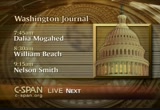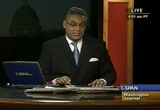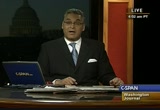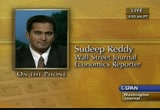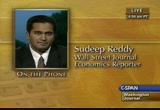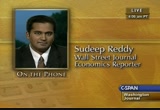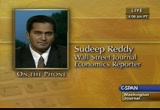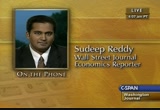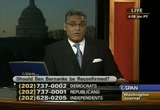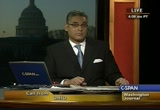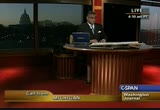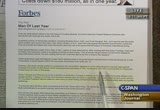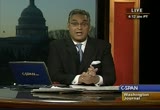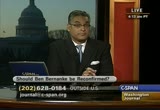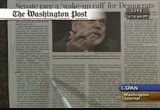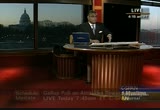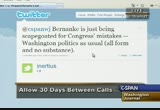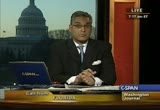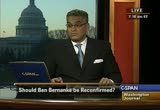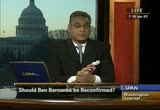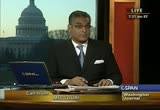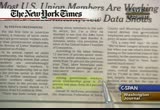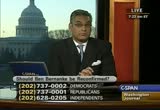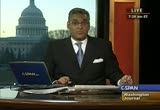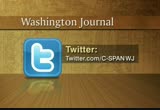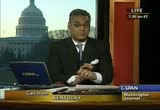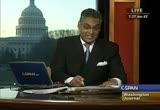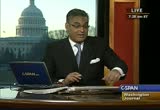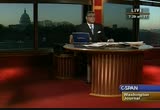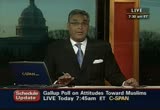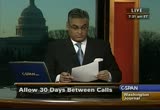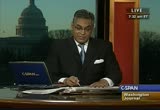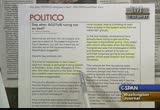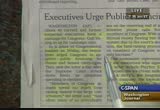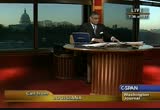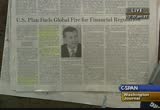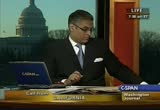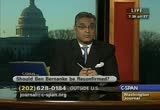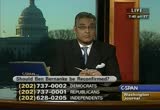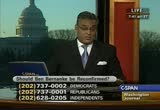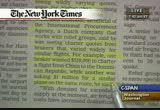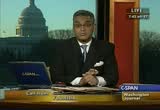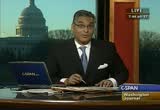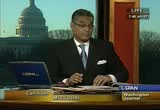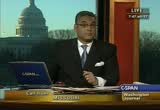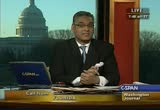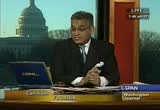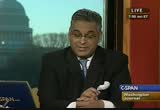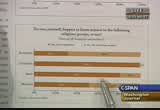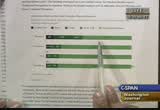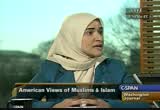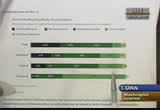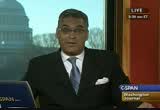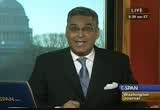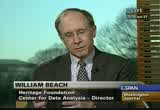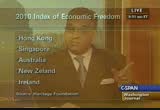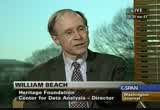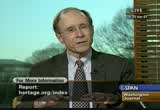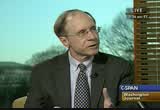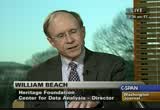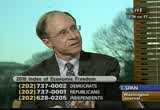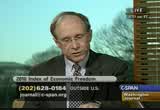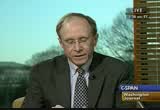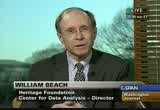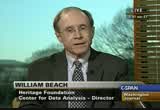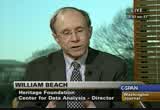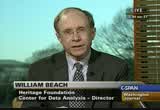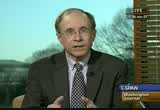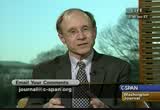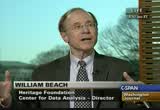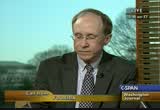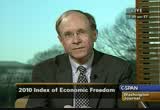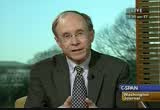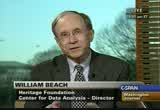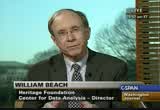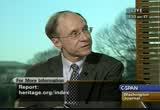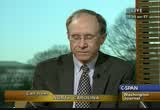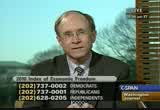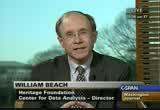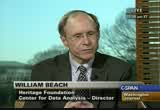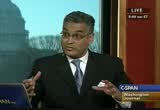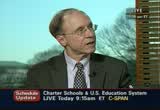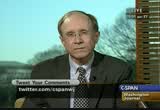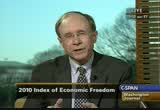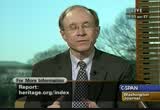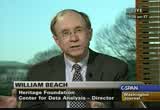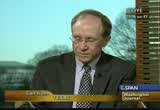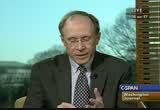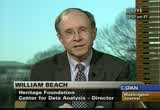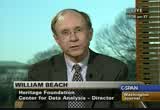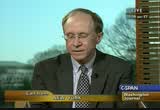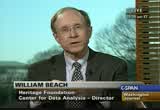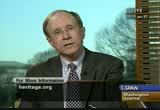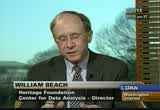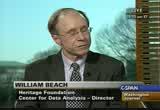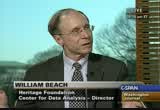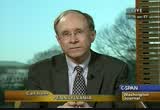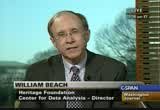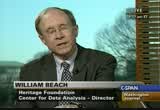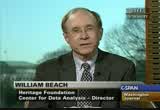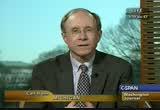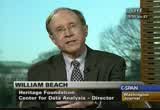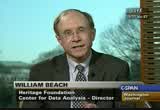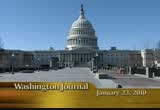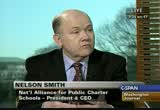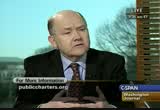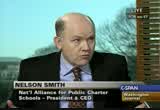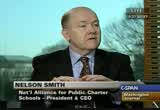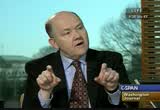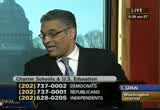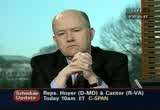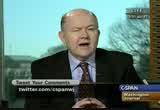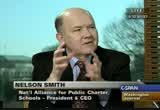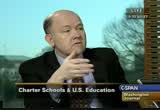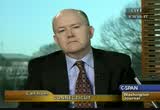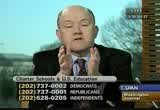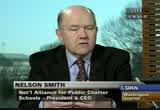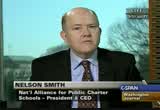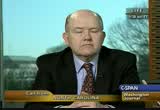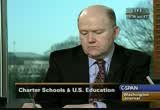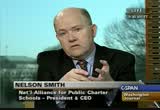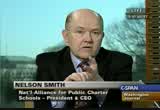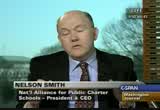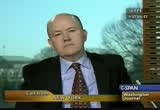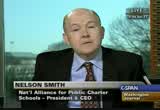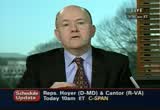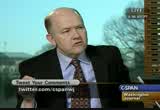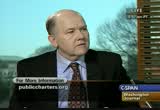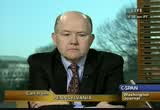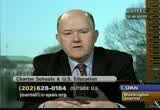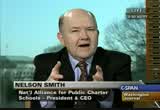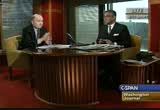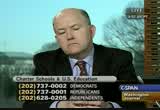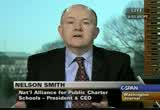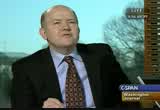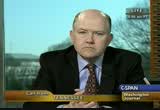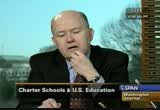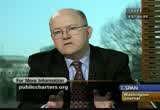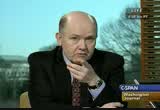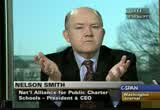tv Washington Journal CSPAN January 23, 2010 7:00am-10:00am EST
7:00 am
7:01 am
independents. the headlines in the major papers all reflecting this thought this morning. this is the "new york times," beck's bid for a second term hits resistance. if did you to "the washington post," takes a look at the populist backlash, puts bernanke under siege, week of steep market losses. that's how this reflects it. it's probably more likely still
7:02 am
that he will be confirmed than he'll be defeated, but the momentum has shifted very, very quickly, and some people on capitol hill are starting to seriously doubt this bernanke vote. half the members haven't decided, so that creates plenty of room for this to get ugly pretty quickly for bernanke and for the administration. host: as far as legislators are concerned, the names that keep popping up are barbara boxer and russ feingold. why are they mentioned? caller: they announced they would vote no against the nomination, and those were just the two latest from the left, that brings to five the number of members from the left who said they would vote no, and both senator boxer and feingold are both facing re-election in november, and that's one of the issues that's been coming up this week, that the massachusetts vote seems to have sent the signal to a
7:03 am
number of lawmakers and is forcing them to rethink a lot of things, particularly the displeasure with washington and how washington has worked. there's a huge wave of populist sentiment right now among both democrats and republicans. to a lot of members, the federal reserve symbolize this is belief that wall street got bailed out and main street didn't, and really more broadly, bernanke, whether rightly or wrongly, has kind of become this lightning rod for the economic turmoil of recent years, the mortgage crisis, the stimulus, the bailout, and now the 10% unemployment rate. host: when people put criticisms against mr. bernanke do, they mention specifics or just, in general, his overall philosophy of governing? guest: well, from the left, the specifics go more toward mortgage regulation and some of the failures that the fed had before the crisis, in
7:04 am
predicting the crisis, and kind of protecting against it. the mortgage policies that we had that fed the boom, and in some cases, the fed has responsibility over those policies and could have done more, and the fed has acknowledged it could have done more to prevent that. there's certainly many on the left and the right who are angry about some of the bailouts that the fed undertook. of course, fed officials say that did what was necessary, and that's backed by a number of lawmakers and prominent economists that the fed did what was necessary to save the u.s. economy from a deeper financial collapse than perhaps another great depression. from the right, there's also some criticism that the fed went too far in its expansionist monetary policy and kind of extending its role in government more than it had before, and so the fed has certainly gone all in to try to prevent this economy from getting weaker, and some people on the right think that they
7:05 am
should have let more banks fail and more financial institutions really take hit for some of the bad decisions they made. host: on capitol hill, what are ben bernanke's supporters? guest: he's got some people on the left and the right who are actually quite important. chris dodd, chairman of the senate banking committee, was the latest on friday to step up his support and make it clear that rejecting bernanke would become a risk for the markets. on the right, jud gregg, the defender from new hampshire, has also been one of the most vocal supporters for chairman bernanke. it's probably use to feel note that both of those members are not going to face re-election in the fall, or they won't be running. that's interesting, because it's easier for them to step up. we had an issue this week with the senate majority leader, harry reid. he met with bernanke on thursday and issued the
7:06 am
statement suggesting that he was on the fence still, and that actually became a problem for bernanke, because it suggested to a lot of other members that maybe reid was ok with allowing them to vote how they need to politically. on friday evening, after some pressure, clearly from the white house, senator reid came out with another statement saying he'd support bernanke, it wasn't quite full support, but it was an indication that he would vote for bernanke. and you now have both the treasury secretary, tim geithner, and rahm emanuel, the white house chief of staff, both talking to senators to rally support. they recognize the implicationness sexftsdz how much investors both here and abroad are watching this very closely. host: when is mr. bernanke's term up and what happens between now and then? guest: his term on chairman expires january 31, so eight grace now. he can actually stay on the federal reserve board after that, because he has a separate
7:07 am
14 overterm as governor. that runs through 2020. but we expect him to give up the chairman's job and hand that over, of the federal reserve board, to the vice chair if this is just a scheduling delay. if he's rejected outright in the next week, obviously, or if there's no vote at all because it looks like he'll go down, either in the coming week or soon after that, it's certainly quite possible bernanke would leave the fed entirely, even though he could remain in that lesser role through 2020. but people at the fed and people on capitol hill still think it's more likely that he'll be confirmed than defeated. it's just got an lot closer than anyone expected it would, and so it's certainly going to be a tight vote. at the earliest right now, we're looking at a possible vote on cloture on wednesday to determine whether there's 60 votes in the senate to defeat a
7:08 am
potential family buster. so that really puts him just a couple of days before the end of his term. guest: sudeep reddy from "the wall street journal," thank you for your time this morning. again, for the next 40 minutes or, so we want to talk to you and ask your thoughts on ben bernanke and if he should be reconfirmed. the number is 202-737-0002 for desms 202-737-0001 for republicans. 202-628-0205 for i understand pents. our email, journal@c-span.org. and you can send us a message via twitter, at c-spanwj. first up, cleveland, ohio, from our democrats line. we're talking about ben bernanke and if he should be reconfirmed. caller: actually, we should abolish the federal reserve and replace it with a national bank. i don't want bernanke. i don't want the federal reserve board. he want a national bank.
7:09 am
i think that's what this country needs. host: why is it brn a federal reserve? caller: they should issue crate from infrastructure, redevelop the country. redevelop the space program, things like that. the federal reserve board seems very concerned with just manipulating interest rates and manipulating markets. it really doesn't create wealth. it just more or less manipulates it. knowing we have to physically create wealth. and i think that's where a bank bank much more beneficial than a central bank. host: if up to the see ben bernanke removed specifically, why? caller: well, knowing his track record pretty much speaks for itself, really nothing more needs to be said. you have to go by what has transpired. granted, some of it was greenspan's fault, but he's got to take some of the blame too. host: fwrill grosse pointe,
7:10 am
michigan. caller: i've been watching the action of chairman bernanke and what's happening on wall street, and the facts are that we're in a war, main street against wall street, and you have to run on your record. what's what happened so far is tax dollars have been shoved out to wall street, and they're using the tax dollars for profits. they're not doing anything for main street. i agree, we do need a national bank. wall street is the middle man, and we do not need -- we don't need the middle man paying bonuses for people who don't produce anything. host: what do you make of ben bernanke's record at the fed? >> it's good for wall street, but it's not good for main street. and what the problem is, we
7:11 am
have too many people who are not running on their record. he has a record that's not good for main street. you just had a senator elected from massachusetts. he ran as john f. kennedy, a democrat, and he did not run on his record. that's why he got elected. host: "forbes" magazine this morning, the man of last year is how they write up this about ben bernanke. it says ben bernanke, whose position is supposed to be nonpolitical, appears to be the latest target for populist rage against bonuses and profits on wall street, while unemployment nationwide is 10% f. politicians can't rein in bank profits or create jobs, at least they can beat on ben bernanke. senators boxer, feingold, and reid are all up for re-election in november. dorgan is retiring. in the week of democrats' defeat in the special election tuesday for the late ted kennedy's senate seat, the party is especially interested in winning back public opinion. thursday, president obama called for new curbs on
7:12 am
bank-holding companies, most widely sign as populist politicking, and it goes on. it's on forbes.com. it's called "man of last year." it talks about the fed. the federal reserve is what we are talking about this morning, specifically ben bernanke and if he should be reconfirmed. you heard our guest saying that in about two weeks or so, his term will end, and facing some opposition on whether he should be reconfirmed. rockville, maryland, our republican line. jerry, good morning. caller: good morning, sir. just a quick question. dr. greenspan has said that the federal reserve has more ph.d.'s per square foot than any place in the world. my question is, if anybody knows, i would loved to have asked your reporter, why did the federal reserve approve the purchase by wachovia of golden west with all their macabre mortgage products?
7:13 am
it almost sounds fraudulent. in all the news reports that i've read, i've heard nothing about this, and i'm just wondering if anybody, any of your lessoners have heard anything or anybody anywhere. host: do you have any thoughts on ben bernanke? caller: well, yeah, he's a good guy. i mean, he's a great guy, and i probably, just on the basis of barbara boxer being against him, i'd be for him. but just this one particular question, it sounds fraudulent to me. it sounds like there's fraud in the fourth largest bank in the country failing because of almost a fraudulent transaction approved by the fed. host: bedford, new hampshire. sandra, go ahead. caller: yes, i think that he needs to go. we need some fresh blood. if he stays, then things are going stay the same. and we just need to get rid of him. host: specifically why?
7:14 am
caller: well, because when you have created such a mess, how can you fix it? we need to learn. people need to learn if they're not doing a good job, then they can be replaced. thank you. host: "the washington post" this morning writes about -- several papers this morning write about ben bernanke, that says paul volcker, former federal reserve chairman and advisor to president obama, said he was concerned that the fed could be left in a vacuum, "bernanke has been through a fire and, given the experience he has had, eighth lot more experience -- he's a lot more experienced and more qualified than he was four years ago qutsdz. if bernanke were reject, volcker added, i don't think that would be received well at home or abroad. anxiety began to build around the fate of bernanke's reappointment within hours after republicans seized a crucial 41st senate seat, throwing president obama's healthcare bill, the entire
7:15 am
democratic agenda, into chaos. the front page of the "wall street journal" talks about many things, but also takes a look at the stock market. several investors and people who study these things saying the fate of bernanke also leading to the current condition of the stock market, which you see there in the graphic. good morning to tom on our republican line. before weather ben bernanke should stay on is kind a moot point, because the fed is basically just a banking mafia that works for the overall global banking mafia, which is run by the rothschilds. the federal reserve is a private banking system creating credit -- actually issuing credit, which is really debt on our part that we have to pay back to them, plus interest. and one caller stated earlier, the banking system of the united states should be a national or federalized system
7:16 am
where the people, through government, issues credit to whoever needs it. that way the money stays within the system instead of going through the pockets of private bankers. so it's really a moot point whether he should be replaced or not. it's who's going run the mafia. it doesn't matter. it's still the mafia that's sucking the wealth out of our nation. host: off twitter, someone who identifies himself as c.p., says bernanke is just being scapegoated for congress' mistakes, washington politics as usual, all form and no substance. largo, florida, independent line. frank, go ahead. caller: good morning. i'll have to second the previous caller's assertions there. hl-1207 has 300 sponsors in the house, and s-604, bills to audit the fed, has over 30 cosponsors in the senate. and we need to call our senators to get this audit of the federal reserve.
7:17 am
after that, it will be very easy to establish a grand jury, which will have subpoena power and indictment so we can get people like bernanke, greenspan, paulson, geithner, larry summers, rick rubin, volcker, people like this that are responsible for everything that we're in right now in recent years, like with the removal of the late 1990's. these people need to be put in frovent a jury and questioned harshly. host: columbia, south carolina. republican line, jim. caller: which people make the statement that the banks much bailed out, they bailed out wall street, but not wall street, they fail to understand that home buy there's walked away from their mortgages because they were upside-down, they got bailed out, too. the bank doesn't have enough money to pay for all those people to walk away from their homes, whether they had to or not. some had a choice. some just walked away because they didn't want to take the
7:18 am
loss. wall street -- the banks do not have enough money to cover a few trillion dollars in real estate losses. them don't have that in their coffers so. people make the comment that wall street was bailed out when people weren't, people were. that's the holes they left in the banking system, and the government is coming in, and in essence, bailing out main street. and when it comes to bernanke, i think that he was part and parcel of what happened. all of them looked the other way when this whole thing was going on, so why don't we get a new fresh batch of team there? why do we need him and geithner? geithner was around with the same problem, probably different levels of the fed, and they both watched this accumulation that fannie mae and freddie mabling and all these bad mortgages going on, and i think they ought to -- why don't they just get new people? we got 300 million in this country, and we got to keep looking at guys like guide zpher bernanke? host: so to your point, if they did get new people, then what philosophy should these
7:19 am
thinkers take? what kind of path should they drive, so to speak? caller: number one, back to the enforcement of glass, separate investment banks from -- separate conservative banking from investing. that's the number one thing that really screwed up. and the simple rules of 20% down on our homes so we don't go into a real estate bubble again. people think it's easy money, and they throw their money in and they want to blame congress for all of the blame. but we need back to basic rules of real estate. and the rules that ran real estate for years since the great depression, and we didn't have a problem until money got easy, people wanted no money down home loans. they told their congressmen they wanted it. gimme, gimme, gimme, and then their congressmen got re-elected, turned the other way and voted for t. so we need to go back to simple, basic rules, but i don't think that people want to hear it. they want things to be quick and easy nowadays. host: the call her mentioned
7:20 am
housing, this blurb from "the washington post" this morning the federal housing administration facing rising losses associated with its flagship mortgage insurance program, announced friday an expansion of its efforts to help distressed homeowners avoid foreclosure, saying that borrowers no longer need to miss a mortgage payment to be eligible for assistance. now borrowers who are at risk of becoming delinquent or facing imminent default will also qualify. they can also have interest rates lowered to reduce payments or have payments suspended for a limited time, according to an f.h.s. statement. belsen, missouri, up next we're talking about ben bernanke this morning, if he should receive another term on our democrats line. go ahead. caller: hi. thank you for c-span. get refused all of them up here. people are just not going to do right, just get rid of them all. when election time comes, we do need new faces, and we need people that's going to do right
7:21 am
by the american people. people coming up for elections, you take like senator mccain, he's old. get refused him. just get rid of everybody. this is crazy. host: well, as far as bernanke, specifically why do you want to get rid of him? caller: i concur with all the rest of the callers that's been coming in. he was back in bush, so just get rid of them all. we just tired of this kind of stuff like this. i mean, they just hurting the whole american people. it's ridiculous. host: a couple of stories about unions this morning. chris mayer writing in "the wall street journal," union membership declined by 10% o. friday, the labor department reported private sector unions lost 834,000 members, bringing membership down to 7.2% of the previous to sector workforce from 7.6% the year before. that says manufacturing sector and construction industry, both which tend to be heavily unionized, were hit particularly hard in the recession, which dampened the
7:22 am
demand for goods. private sector construction lost 237,000 union members, while manufacturing lost 253,000 union members. more than half the loss of private sector union jobs. also, there is a story in the "new york times" this morning. steven greenhouse write, the headline is most members are working for the government, according to new information, and just a sentence from there. union membership grew from 37.4% last year from 36.8% in 2008. in from florida, republican line, and we're talking to rob. go ahead. caller: yes, sir, whether or not bernanke stayed in there is neither here nor there. they're just going to put in another puppet. for people to think he makes these choices all by himself is crazy. greenspan doesn't do it. he's just there.
7:23 am
they go to the wishes of the big-time government, they're overseeing the whole ball of wax. bernanke, who weather he's not or not -- host: who specifically are the people that are overseeing it then? caller: sorry? host: who specifically is overseeing it? caller: the bigger government. you know, they sat there over this thing, to think that they all didn't see everything that was going on, coming with the crash, to sit there and make these bailouts of billions and billions of dollars, and all the sudden they can pay all this money back within a year, were they hurting as bad as what we thought? host: so in your mind, it doesn't matter who heads the sned caller: no. someone else is coming in, and the stock market will do just like -- as soon as they hear this, starts dropping 400 points in the last two days. you know, as soon as they get somebody else in there, it will be the same puppet. host: joe, go ahead. caller: well, i think mr. bernanke is doing a great job, except he's not working for the american people. he's working for a private
7:24 am
corporation called the federal reserve. that is also unconstitutional. the u.s. constitution specifies that congress will decide on the value of money, not a private bank like that. let's face it, folks. these people are able to create money with the stroke of a pen, and then they loan it to us and draw interest for it. bernanke deserves his next term in leavenworth, i think. host: off of twitter, a.i. chimes in this morning, saying that bernanke is blamed and buffett are time bombs y. did congress and bush make no laws regulating them? we're talking about ben bernanke, head of the federal reseven. his term is up in about two weeks. questions this morning on if he'll be reconfirmed. several legislators seeking aim for the condition of the country and the decision mailed from the federal reserve. we're asking your thoughts on if he should be reconfirmed. if you are just joining us or
7:25 am
are now to the program, if you are a democrat, you call in on 202-737-0002. if you're a republican, 202-737-0001. and 202-628-0205 is the number to call if you define yourself as an independent. two other means of communication. you can join us this morning, our email, as always, journal@c-span.org. and if you follow us on twitter , and you do that regularly, you can twitter, it c-spanwj. we have 371,000 people followingous a regular basis so. if up to the chime in and join us there, you can too. louisville, kentucky, democrats line. bill, good morning. caller: good morning. yeah, i think -- i don't think that mr. bernanke should be replaced. i think everybody's kind of paling on him. seems to me that a person could be able to stay in the best position for two decades as
7:26 am
alan greenspan was. his name was barely mentiond because of his wife being andrea mitchell, which i'm confused about how she can have a political show on a network program but you can't really discuss what happened to this country, and he's a great deal why what happened, happened. i think who should be replaced is just people like rahm emanuel. i think it would be great to have david to replace him as chief of staff, and geithner to be replaced. they have a bad decision. mr. bernanke deserves a chance. he hasn't been in there long enough to make a bad decision. so i think he just needs to have a chance to see what he can do. host: david has an op-ed in
7:27 am
"the washington post" tomorrow, but we have an early advancer of it, and the headline says november doesn't need to be a nightmare for democrats. this is stemming from the oonts of this week. this is some of the recommendations that he has. he says, we still have much to do before november and time is running short. every race has unique characteristics, but there are few general things that democrats can do to strengthen our hand. he says, one, pass a meaningful health insurance reform package without delay. you'll excuse me as i flip the page. he goes on to make some other points. he says we need to show we are not just focused on jobs, but also create them, make sure that voters understand what the american recovery and reinvestment act can d for the economy. don't accept any lectures on spending. the g.o.p. took from us a $236 billion surplus when president bush took was to a $1.3 trillion deficit with unpaid tax cuts for the wealthy and the medicare prescription drug program. change is not just about policies. in 2006, democrats promised to
7:28 am
drain the swamp and back congress largely because the american people soured on corrupt republican leadership. many ethics reforms were put in place by democrats, and he goes on to finalize, run great campaigns. again, this will appear in the paper version tomorrow. i believe if if you go to "the washington post" website, it is already there online if you want to read the full text of it yourself. it's from david plouffe. he ran the 2008 obama-biden campaign. should ben bernanke be reconfirmed? atlanta, georgia, up next. republican line, antonio. you there? we're going to try antonio one more time. are you there, sir? don't believe he's there anymore. steve, good morning. caller: hello. host: hello. you're on. caller: yes, thank you. concerning ben bernanke being reconfirmed, i'm going to have to say that it doesn't really
7:29 am
matter who is in charge as chairman of the federal reserve, because the federal reserve is a privately owned bank. they can have whoever they want up there. but as a previous caller did say, this person does not answer to the government. he can be in charge, but they're a privately owned bank and the federal reserve, owned by people out of europe, people out of america. it's a privately owned bank so. as far as keeping his job, he probably will. the federal reserve made $51 billion in profit in 2009. most people don't really understand that. but for the simple reason that they made more money and profit than exxon mobil did back in 2007. nobody's complaining about
7:30 am
that. it's not really anything that he thooze worry about, because like i said, it's a privately run bank called the federal reserve, where we don't have to see their books. it doesn't really matter. he's going keep his job, because he turned a $51 billion profit. i think he's probably in safe hands. that's all i have to say. host: union, missouri, on our republican line. greg? caller: yeah, i think they ought to confirm ben bernanke. i think the other person they need to look at is tim geithner. we need to you'd i am him. he is aware of what the bonuses are about. he led them get the bonuses, and also, a.i.g., we need to look into that. host: what are your reasons for having mr. bernanke reconfirmed? caller: oh, i think he's got some stability. he's fought through the tough
7:31 am
times. and he's hung in there. and i don't care who they get. this guy has got -- he's an intelligent person. he makes things happen. also, i want to talk about the 400-point drop in the last two days. president obama is the person that brought that on. and the reason why, because he's criticizing the banks. the other thing to that, it they're criticizing the banks, and he's received campaign contributions. he got campaign contributions from a.i.g. so does this make sense? what is he trying to do? he's trying to fool the american people that he's trying to do something against the banks. there are several stories about
7:32 am
campaign finance law. this is in a supreme court memo, justices turn minor movie case into a blockbuster. it talks about what happened as far as the actual writings of the justices, particularly justice stephens, who wrote the 90-page dissent he said majority got to that result. those points who were defensive and defiant, chief justice john roberts. it says justice stevens' bill had three major elements. the court had reached out to decide questions not properly before it and issued a broad ruling when narrow grounds were available and failed to show due respect to the president n. his concurrence thursday, chief justice john roberts said he respected the president must have limits. otherwise, he said, "congratulation would be legal, minimum wage laws would be unconstitutional, and the government could wiretap ordinary criminal suspects without first obtaining warrants." again, there's more this
7:33 am
morning. that's in the "new york times." the politico has some of the reaction from those here in washington, d.c., to the decision. this is jean cummings. he quotes ken gross, a campaign finance expert from a law frm here in d.c., he says it's time for everybody to calm down. he says he thinks that who other lawyers in the field also think that possible repercussions of the decision have been exaggerated. the reality of the decision is likely to be something more modest, mainly shifting of cash that's already in the system away from so-called 527 groups. in the last decade, corporations have actually been trying to get out of the business of big political giving. they sided with reform advocates when the mccain-feingold law was first challenged in 2003, and testified on behalf of its ban on unlimited corporate giving to the political parties which were dubbed soft money
7:34 am
donations. reasons for this reluctance were complex some. executives hated the way politicians always had their hand out, make ago peels that were difficult to turn down for fear of retribution in the legislative process. orpse dent like the lack of control they had over how their money was spent. huntington beach, california, republican line. good morning. caller: good morning. i think he should stay in. just about anybody that's in there is up against the same problem. and just real quick, the problem is the cost of the federal government, state employees, local employees, want just bernanke's problem, but anybody who's in power. they're all basically not working for us anymore. they're working for just keeping people in their government jobs. we have to pay for the private sector as being choked to death by people in government jobs. there's way too many people working in government jobs out there, federal, state, and local. they're you will against the same thing, including bernanke.
7:35 am
bernanke should stay in there. we should get a real good discussion in the media about why there are so many government jobs, state, local, and federal. it's choking and chilling the private industry. hope the associate prets has a story about urging public financing for campaign. it's a letter to the congressional leaders that were sent on the part of friday by 40 current and former corporate executives.
7:36 am
host: gonzalez, louisiana. good morning to ed on our independent line. caller: good morning, pedro. thank you for taking my call. and thank you to c-span, the voice of the people. pedro, look, this ben bernanke thing, michael milken went to jail for what they did. michael milken, the guy from california, went to jail for exactly what ben bernanke is doing. ben bernanke should be in jail, and everybody that's complicit and culpable in this ponzi scheme that the government has created. they need to go directly to jail. but listen, why are these revelations being made? i mean, caller after caller after caller are saying, look, we know what's going on.
7:37 am
we know what you're doing. well, how do they know? because this revealed two people. what's the agenda? why? why are they revealing this? because they control the information flow. what's the point? everybody needs to think about that. that's what's going on. thank you, pedro. have a good day. host: steven, and "the wall street journal," u.s. plans fuel global fire for financial regulation. it talks about the international reaction to the president's initiatives towards banks this week. they write international banks say they were awaiting details of the u.s. plan, but the proposals, which would bar banks that take customer deposits from making big bets on financial macts for their own accounts, received a positive reaction from finance officials around the world who said they were likely to influence other governments seeking to deal with banks that became too big or interconnected to fail. mario draghi, the chairman of the financial stability board, the body charged with
7:38 am
coordinating international financial regulations, welcomed the obama initiative, which he said, "restores momentum to regulatory reform efforts" t. shows the u.s. is leading the effort, which gives important impetus elsewhere, he said in an email to "the wall street journal." san diego, california, you are next on our republican line. charles, go ahead. caller: hi. thanks for having me on, and thank you to c-span. i actually have a degree in investment, so you'd think i would side with the fed. but no. bernanke should not be reconfirmed. he was the one guy that was willing or able at the moment to take over the fed, they said. but really, they were talking about the one guy who would be radical enough to implement unconventional policies which really is leading us down, risking our economic system,
7:39 am
our capitalist system, by risking monetary policy to the point that there's going to be -- it's going to be subjects to political control. and monetary policy can't run if it's controlled by the political groups in congress. it just would not work. host: when you say unconventional policy, what's within that? what do you mean by that? caller: well, twheats the federal reserve called their policies of setting the interest rate down to zero. and then printing a bunch of money and believing that it wouldn't great hyper inflation and high interest rates immediately because there wouldn't be -- because it wouldn't immediately create high inflation and high interest rates, because zero interest rates, there wouldn't
7:40 am
be an incentive for people to just go out and push, push, push with monetary -- with supply. so they're calling it unconventional by tying the interest rates to zero, they think something different is going to happen. it's unconventional. it's not done before. but it actually puts us in a position, when we try to untie it from zero, when we try to raise interest rates, now all hell is going to break loose, excuse my expression, but this is also the problem. instead of controlling the interest rates and the money supply, now interest rates are kind of out of control, and it leads us down a path that could lead a couple of different directions. it could lead to a global decurrency, because it could devalue the currency and discredit american capitalism itself.
7:41 am
which, by discreating american moan teafl policy by decrawling the dollar, we're risking either moving away from the dollar as a global currency standard and moving to some global currency or moving -- or just basically defacing capitalism. host: we'll have to leave it there. appreciate the thoughts, though. there is a story this morning that deals with aid shipments that are going to haiti currently, and this talks about the cost of those emergency aid shipments. they may last a while. they write that the industry, the air cargo industry, is a mechanics of brokers and companies large and small and rates depend on a multitude of variables, so gouging normal prices is elusive. but two officials of relief supply companies separately
7:42 am
said they were seeing wildly varying quotes for some far higher than anything they considered reasonable. michael rid now, an official with the international procurement agency, a dutch company that works with relief groups, said he was seeing charter quotes from broke there's varied widely for similar flights. for example, one broker wanted $519,000 to charter a flight from china to the dominican republic, while another was asking $1 million for a similar plane on the same route, he said. "with demand far exceeding supply at the moment, air freight costs have increased dramatically," a spokesman for the world food program in rome said. a senior brit, relief official speaking on the condition of anonymity, said air freight costs from europe to haiti has increased by 10% to 30% since the quake. miami beach, florida. good morning. democrats line. go ahead, george. caller: yerks i would like to say that, i would like for all of your listeners to pay attention to what's really
7:43 am
going on here. mr. bernanke should not be held accountable for what's going on in the world. it's not just the united states of america that has problems with managing their budget, i put it in that context, but what's really happening here is the republican party destroyed the middle class. no one heard of this vast lack of funds flowing around the world until mr. obama came into office. george bush and that group told the american people that the economy was fine, everything was great, and all the sudden mr. obama came into office, and the republican party began to
7:44 am
attack everything that the man has tried to do. along with the federal reserve, but if you know, no one, no one at no time challenged the fed at this level until we now have a new president. thank you. host: a familiar face to congress, and if you watch our communicators program saturday evenings at 6:30 on c-span, a familiar face as well is dan glickman, the head of the motion picture association of america. he announced he'll be leaving as of april. says in the papers this morning that he's going to become the president of refugees international, which is a washington-based nonprofit organization that works on behalf of people displaced by conflicts, like those in rwanda and the balkans. he said in october, mr. glickman and the mpaa announced his plan to leave when his contract ended in september a
7:45 am
spokesman for the association said they cannot provide a time table or details of the search for the next president, which is reviewing a broad range of candidates. mr. glickman, a former democratic congressman and agriculture secretary, took charge of the association, which represents major film studios, in 2004. and speaking on telephone only friday, he said he was proud to leave the film industry on issues related to glonal trade and the enforcement of digital rights, and to have protected by the vitality of a movie ratings system that it helps to oversee f. n case you're wondering who's going to be on tonight at 6:30, gordon smith, former senator from oregon, and he is the current head of the national association of broadcasters. we'll talk about issues relating to that industry. again, you can see it tonight on c-span at 6:30. chesterfield, missouri, on our republican line. ridge reginald, go ahead. caller: good morning. host: good morning. caller: a couple of things.
7:46 am
the short-term memory and the blissful ignorance of many of of the american people is astonishing. and this is simply calling what it is. when was the last time you heard the term outsourcing? do people think they're outer sourcing is a good thing and all the sudden we're magically in the snole it's been screaming out of this country since the mid 1980 's. we've even had union drives, who many people find it fashion tooble despise, many of whom our grand parents and parents were union people perhaps, which includes us upstanding and stable household for them, be it's somewhat ridiculous. scommoip can i ask how those
7:47 am
thoughts relate to mr. bernanke. caller: because why are we talking about bernanke instead of chris cox? this guy's been going through it right about now. chris cox started this. chris cox's signature is on most of these approved shenanigans and the rolling back of our regulations. all the sudden regulation is a bad thing for banks. but in our everyday lives we work with this. in congress, we deal with this. and also, one more thing, because i know you can only call every 30 days, i understand. what you're going see, you're going see a dynamic switch. no longer will politicians, democrat or republican, be able to scream and carry the banner
7:48 am
for pop you're lism, because now the coffers are open. and now you're going see which side will they choose. i began you they're going to go guys who write checks all alone. host: boca raton, florida, is our last caller, independent line. lee, go ahead. pushed the wrong button, sbore that. lee on boca raton, go ahead. caller: yes. hello. can you hear me? host: yes, i can, thank you. caller: good. i have been an independent since right after the 2000 election. to blame bernanke is absolutely ridiculous. we have to blame ourselves. we are an ignorant electorate. we elect people who are not up to the job. and last president before this one was elected by the supreme court. where is the outyy on what is going on? the republicans -- and i used to be one -- had led us down a garden path that said led to this ruin, and to blame obama
7:49 am
is stupid. and i was not an obama backer. i wanted hillary clinton. the reason i was not for obama is he didn't -- he didn't have any experience. so we vote for the next president, and we vote for obama who was bright, but no experience. what do you expect to happen in this country? this is only the beginning. we better start a real third party. scommoip as far as mr. bernanke goes, should he get another term? caller: absolutely not. i think we should throw them all the hell out and start a po host: we'll leave it there. we're going to change topics right now. the gallup center puts out regular polls on a lot of different topics. their latest one deals with how americans view muslims and islam. they went through and asked questions on those two fronts. we're going talk about the details that have poll with our guest when we come right back.
7:50 am
>> this weekend -- former senator and how head of the national association of broadcasters, gordon smith, on the f.c.c. plan to expand the broadband spectrum and what it might mean for broadcasters, today at 6:30 p.m. eastern on c-span. wednesday, president obama delivers his first state of the union address to congress, laying out his vision for the future of the country and his plan to deal with issues such as unemployment, healthcare,
7:51 am
and the wars in iraq and afghanistan. the state of the union address, wednesday night. our coverage starts at 8:00 p.m. eastern on c-span. you can also listen to the president's address live on your iphone with the c-span radio app. >> abigail adams had to remind john adams to remember the ladies when creating a new government. dolly madison had to encourage her once-shy husband, james. this weekend on "afterwards," the intimate lives of the founding fathers. thomas fleming profiles the women who played a central part in creating our country. afterwards, part of this weekend's book tv on c-span2. >> "washington journal" continues. ho o executive director of the gallup center for muslim studies, dahlia mogahed. she's here to talk about a poll look agent muslims and islams. why is that? guest: i think that this is an important topic for several reasons, one of which is the president has made it a
7:52 am
priority to reach out to communities around the world. so at the gallup center for muslim studies, we actually focused on this topic, and we felt it was important a year into office to look at how americans perceive muslims and islam. host: and so, when you talk to those who you polled, what kind of questions do you ask them, and what was the end result of what you found out? guest: we asked the american public, a representative sample of american households, what their opinions of several religious groups, not just muss himself. muslims, jews, just as well as christians, and we asked them if they knew a member that have religious group, their opinion of the religion itself, islam, christianity, and so forth, and then we asked them to tell us if they were really honest with themselves, how much prejudice, if any, do they have toward each of the religious groups that we discussed. we also looked at a focus on muslims in general and what
7:53 am
were people's opinions about them as a group. so how do americans feel about muslims and gender equality, tolerance of other faiths, accepting people who are different from them. host: what was the difference between how people -- or at least americans perceive muslims? guest: it's a really interesting question. we found that americans felt more positively about muslims than they did about islam as a faith. so majority of americans expressed negative views of islam as a faith, whereas, the majority, about 53%, say that they don't have prejudice toward muslims. so islam fares a bit worse than muslims as a group. host: and as far as looking specifically at islam as a faith, how did those who answered that the way come to their conclusions? guest: well, that's an interesting question. we didn't look directly at how
7:54 am
people who came that that conclusion, you know, how did they get there. what we did look at is those who expressed prejudice toward muslims. about 9% say they have a great deal of prejudice t. what was behind that? we did what was called an odds ratio analysis where we look at what factors make people more likely to fall into that group. we also did the same analysis to look at what factors make people more likely to say they have no prejudice. host: so as far as the factors, what did you find out? guest: we found out the factor that is most strongly associated with anti-muslim prejudice was for someone to express anti-jewish prejudice. so all else being equal, demographics, education and so forth, a factor that comes out as strong is someone who has anti-jewish sentiment is much
7:55 am
more likely for also have anti-muslim sentiment, and that came out always the strongest variable. host: was there any explanation why that is? guest: well, of course, it's up to analysts and intellectuals to think about what could have caused that connection. what we found is that there was a strong link between anti-jewish and anti-muslim sentiment, and there are several reasons why that could be. host: as far as the perception of anti-muslim sentiment, perception being one thing, ultimately, are you concerned that the perception turns into actions at some point? is that some of the reasoning of why you take these polls? guest: well, there's the possibility that perception does lead to behavior. what we're looking at is an understanding of what's behind perception, how much -- how many people have certain perceptions, how they change over time, and then we're also attempting to get at the question of why. why do people have the
7:56 am
perceptions they do? it's really to give leaders the information they need to make better decisions. that's what gallup has been doing for 70 years. host: is it fair to say perceptions are formed when they hear of access to muslim extremists in other cases, or in some cases, this country? guest: it's entirely possible. we also looked at media content analysis done by another firm called media tenor, which found that even as far back as 2007, islam received the highest volume of media coverage of any religion. and at the same time, also has the most negative coverage. and so there's this steady stream of negative coverage when it comes to islam. so even though many americans don't know a buddhist, for example, and don't know much about buddhism, very few have prejudice against buddhism. so americans in general
7:57 am
naturally are not prone to prejudice. if they don't know someone, they're actually prone to not have prejudice. prejudice really has to be taught. it's something that has to be learned. host: what's defined as negative coverage? guest: well, that's an interesting coverage. there's an entire methodology and code that media tenor looks at. and they actually look at negative statements made when a reporter is covering a story about islam. host: such as? guest: for example, an act of violence was done because of the faith, or something linking the faith to something negative. we also look at neutral, as well as positive coverage and found that the majority is negative. whereas when they looked at coverage of christianity as a faith, the majority of the coverage was neutral. they also found that protagonists representing each faith were quite different. so the majority of people
7:58 am
representing islam in the media , or in news coverage, rather, are militants, are militants. so our militants are being portrayed as religious actors, whereas when it comes to christianity, it's really just leaders. they are the ones representing christianity as a faith. host: how many people were sampled in this poll? guest: 1,000. that he wants the industry standard. host: and is it available on the website then? guest: yes. if you go to gallup.com or muslimlellsfacts.com, you can download the full report. host: our guest is here to talk about her findings and talk with you as well. there are several ways duke that this morning. if up to the call in, three lines 206782-737-0002 for democrats. 202-737-0001 for republicans. 202-628-0205 for independents. and journal@c-span.org is our email. and if you follow us on twitter, that's twitter
7:59 am
.com/c-spanwj. how has president obama done one year in, from the initial speeches that he snakes guest: we found that there's actually been an improvement across especially arab countries when it comes to approval of u.s. leadership. we took a poll shortly before the cairo speech, and then one after, and we actually found that, in many countries, there was a 10 to 15-point improvement in the approval among people of u.s. leadership. so there has been -- the trend is toward improvement of the opinion of the united states among muss himself. host: when was this poll taken? guest: this poll was taken in late october, early november. it was a three-week field period. host: so before the events of december. the reason being, i was wondering if it was swayed by the december events. guest: it was before december, the december events. but it did span the fort hood attack.
8:00 am
8:01 am
host: we'll leave it there. wyominging democrat's line. go ahead. caller: yes, i'm prejudice against all organized religions. to me, to have one mindset, anybody that walked into a building and you're brain washed into this briff, especially with you wearing that scarf around your head host: i'll keep it there, caller. we invite our guests to be with us and ask all of us, despite your position, to refrain from making personal attacks. that said, for those taking the poll, part of it dealt with people who find themselves as a
8:02 am
member of an organized religion as how they perceive not only many types of other religions but must limbs and izz lambs. what was the finding? >> we find that church attendance was associated with less prejudice. so people who say they go to church more than once a week were half as likely to have extreme prejudice toward muslims, and people in that same group were likely to say they have no pridge dis. so the last caller who said he had prejudice against all organized religions, that was a segment we discovered in the survey. there was a group who had literally against all prejudice against all jews, muss limbs and christians because they think religion -- and if you look at demographics, they think in religion is
8:03 am
objectionable. so i think the data does challenge perhaps a lot of conventional wisdom about what is associate d with prejudice. >> one of the charts here, according to the questions you ask, do yourself happen to know anyone in the following religious groups or not. budist, 32% defines as some said that yes they know someone. 99% of those who responded say they know someone in the christian faith. and 52% said they knew someone in the muslim faith. does that surprise you at all? >> the number is quite high in past polls that number was smaller than a majority. so it appears that people are more aware maybe of the muslims they do know. maybe they didn't know their doctor or their dentist was muzzyim. or that muslims are being more proactive in getting to know people. i think what was interesting
8:04 am
about that data was that knowing a muslim just simply knowing a muslim was not significantly associated with having no prejudice. however, if you didn't know a muslim, that actually made someone more likely to have extreme predgedizz. dis. so what that means is knowing a muslim is associated with softening extreme prejudice but didn't enough to eliminate it altogether. host: tony on our republican line. caller: thanks for taking my call. this is no question of people being prejudice against islam. i've lived with muslims all my life. i come from nigeria. but muslims are very intolerant of other religions. look at what is happening in religion now. so don't say people are
8:05 am
prejudice against muslims. all over the world, they are the cause of all problems. and that's all i have to say. iveragetsdz i think the caller is making a point that actually gotten in e-mails and some feedback on the poll. it's important to understand how we define prejudice and it's completely self-reported. so we're not attempting to judge whether or not someone is prejudice based on their views of muslims any other way than for them to tell us that they are prejudice. so that's an important point to make. this is completely self-reported and people may very well and some people in our poll have negative views of muslims such as the ones expressed by the caller that muslims are intolerant or perceived to be intolerant. and at the same time tells me they have no prejudice whatsoever and we will accept
8:06 am
that as being no prejudice. it's interesting to note, though, that when we look at muslim public opinion we have actually asked them about their opinions of other faiths. so that was a question i think some people have. how do muslims feel about christians. and the answer is maybe to the surprise of many, very positively. vast majority of muslims feel they have a positive point. in lebanon, most have a positive opinion of christians. so christianity or christians is actually viewed rather positively by most muslims. what they express unfavorable opinion about is the united states and specifically the united states government. not the religious christianity. when you look at the data, it's associated mostly with their
8:07 am
perception of our policies, not our culture principles or religion. host: washington, d.c. caller: good morning. i've called many times to npr and the reason i'm going to focus on their coverage of a few stories is to highlight how hate is manufactured. and it's not something we're born with. and for example, like the gentleman that just called about nigeria. he was told that muslims were writing but he wasn't told that from the 500 killed, 480 were muslims. that the people were butchering muslims over there. but to manufacture hate, american media would say that yes the muslim is right, 500 killed leaving out the nact that it was muslims being butchrd. also, like, for example, the other place. and i called npr and i spoke with the person who is responsible for the truth in
8:08 am
npr and she just basically ignored everything i said. anyway, another issue about yemen and i called them also and i told them six months ago there was a national alliance against the dictator. i said tens of thousands of troops, all united to say we want to get rid of this guy. not anything religious. they sense he has been singing the tune of al qaeda. he says there is 200 al qaeda. no, there is 20, 30,000 people trying to get you out. and he is using this. host: caller, you've made your point. we're not affiliated with npr but do you have a specific question for our guest this caller: how can we get the american media to highlight the fact that this is being used? one more issue. host: you made two already. we'll leave your question stand as it is.
8:09 am
iveragetsdz i think the caller's frustration with the media is shared by efrl people. there are of course pressures on media to make stories interesting. but it is important to look at objective data on media content abliffs and to ask, is it really doing the service that it's mebt to do, which is to report things in a neutral way. i would like to also pick up on one other quick thing, which is this idea of the victims of rioting or terrorism. so the numbers do pan that out that the victims of terrorism, the vast majority are muslims. they are the primary target. and not only that, but muslims around the world, according to our research, are more likely than americans to express concern and fear of being victims of a terrorist attack. so this is an issue that is shared. host: the way you define prejudice is one of the ways
8:10 am
you went into this. how is prejudice defined from those you took the information from? iveragetsdz it's defined however they would define it for themselves. so the question was, if you were on honest with yourself, how much prejudice, if any, do you think you have against each of the following religious groups. host: 9% a great deal, 20% said some, and 15% said none at all. so the other weighed out the other three combined. was that encouraging you to you? iveragetteds >> however, when you look at compared to other faith groups, it does tend to be significantly higher. so the percentage of people who say that they have no prejudice against jews, budists and christians are similar and it's
8:11 am
well over 57%. host: next call is haiti, texas. terry on our republican line. good morning. caller: good morning. host: i'd like to make a comment. i have jewish friends. i'm a christian. i have jewish friends, i have a couple of muslim friends. and i don't believe that anybody should be prejudice against anybody for any generalization. but what the muslims don't do in america is, like, after the bomber came in from nigeria, the one that went through yemen, all right, detroit the next day, they had 50 muslims
8:12 am
that come out and by the jail there, and they picketted against this type of thing. well, the muslims don't come out and say, look, we don't like this no more than you do. and i know they don't. but they need to come out and stand up for themselves more and say, look, we're not for this kind of thing. these people, they don't speak for us. i think the muslims in america need to stand up and make themselves known how they feel so so many people don't go around wondering. guest: i think the caller's sentiment is one that's shared by many people. i've heard this from almost every audience that people really are demanding that muslim americans specifically
8:13 am
be louder in their condemnation of the terrorist attacks. now, it's important to know that all the major national organizations have and continue to issue condemnations of these terrorist attacks. it's also important to note that the many of the victims would have been muslim. people in that plane headed to detroit, while detroit is home to many muslim americans, so just like the caller said this is something that affects everyone. and i think what muslim americans have told me, not in a poll but just anecdotally is that they feel just as american as everyone else and just as victimized by this terrorism, or any teamtsd terrorist attack and don't feel comfortable that they would have any special duty to condemn it more than anyone else. that people should understand
8:14 am
that just like their christian neighbor and their jewish neighbor, they are -- they should just assume that muslim americans are just as against it without having to do something extra to prove it to people. host: how would here in america the findings that for those prejudice against muslims or izz lambs, how would that compare to those around the world? or guest: that's a good question. we've done similar research in germany and france and the uk and we do find that the united states tends to be less prejudice than, say, germany or france. so it's on par with britain. but less prejudice or more favorable than france or germany. host: louisiana, democrat's line. go ahead. caller: yes. i started listening a little late so maybe you've answered
8:15 am
this question or maybe it's not an appropriate question for your poll. but something i'd like to know, what is the philosophical difference between christianity and islam? guest: well, that's a very deep question that i think would take a while to explore. and i would encourage you to refer to some web sites that would explain the differences. i think it would be outside the scope of this program. thank you for your question. host: lincoln, nebraska. sam on our republican line. caller: good morning. my question really was similar to the previous one. but i would like to add, does islam recognize christianity? and if it does, can you explain ? second, why when there is something bad happening in the
8:16 am
world, you know, crime or something happening, if it's muslim who does it always religion is connected with it but there are thousands of people die in the united states daily from crime. nobody refers to them as christian crimes or other religion crimes. can you explain that to me, please? thank you. guest: i think the caller's question, does islam recognize christianity. and the answer is yes. islam's core ran recognize christianity. the second piece is around framing i think the issue of are violent actors being portrayed as religious actors. and that does tend to be the case according to media content analysis that there is an issue with how things are framed.
8:17 am
not only are there just more coverage of violent abts which make sense because these things are happening and they're news worthy but they are framed as religious acts. host: our head, the -- our guest is the head of the gallup study. we will continue on this topic for about 15 more minutes. new york on our independent line. caller: good morning. i would like to thank c-span for having your guest because i find the media does not usually bring muslim guests to explain what our muslim values or issues are. so one more thing that i find that people tend to take what they hear at face value. i would like just to mention something for anyone who would like to get information about islam.
8:18 am
it is very widely available. just pick up a copy of the koran. ask for a free copy to be mailed to your house and read it for yourself rather than listening to others who tell you what's in the koran. and what can we do in order to bring more awareness of the real islam versus what most people hear from media? and i'm going to leave it there. thank you. guest: i think the question is very important. because we found that one of the strongest factors associated with no prejudice is, well, first, the strongest one was having a favorable opinion of jews. so there is this link between the two. but among those are -- is a positive opinion of islam or a favorable opinion of the faiths. and, again, more important than simply knowing someone. so i think that from that, if someone were to want to reduce
8:19 am
prejudice, one of the most important things that has to happen is for people to have honest dialogue about islam as a faith and what it teaches. and for the questions, these honest, well intentioned questions to be answered authority tatively and accurately by people who have studied the faith. host: islam is the most negatively viewed religion. this is a poll. 31% said when it comes to islam they were not favorable to it, 22% said not too favorable, 32% said somewhat, and 9% said very favorable, with 5% saying don't know. what else do we learn from these numbers? guest: we learn that there's a lot of work to do for anyone who is interested in fostering better relations or greater understanding between faiths. because islam, when so many
8:20 am
people have unfavorable opinions of islam and it is associated statistically with unfavorable opinions or express prejudice towards muslims. so there is this connection between how people feel about the faith and their own self-reported prejudice against the people as a group. i think that that probably would concern many people outside even the muslim faith. host: new jersey is up next on our republican line. tom, go ahead. caller: good morning. my question to her is, basically, very simple. ok? what is more important to her, her religion or the american flag and its rules and laws? thank you. host: you can answer that if you wish. guest: an interesting personal question. i think it's important to know that muslim americans and muslims actually even in europe have expressed an equal sense
8:21 am
of importance for both their religion and their faith. so we find in the data that the two are not contradictory or compete ideas but rather complimentry identities. so people who identify strongly with their faith also identify strongly with their country. america or france or germany, whatever the country may be. and that we find that there is no correlation between a strong religious identity and a lower or a weaker national identity. the two can be strong at the same time and indeed they can even strengthen each other. host: when it comes to how much knowledge about the following religions, according to the poll, 3% said they had a great deal of fonl about islam, 34% some, and 23% said none at all.
8:22 am
can you clarify what defines a great deal of knowledge compared to some knowledge? >> it's again self-reported. however someone would assess their own knowledge. it is interesting to note that we still find the majority of americans say that they have little to no knowledge about islam. despite the heavy media coverage and despite the growing engagement between the united states and muslim majority societies, i think this is a gap that is important to phil. host: just by comparison, 67% said they had a great deal of knowledge. detroit, michigan, up next. darren on our democrat's line. caller: i would like to say that it depends -- would you say it's the personalities of the person who has the religion? we have -- wouldn't it depend
8:23 am
on the personality of the person who has religion? a lot of folks forget that mohammed aly is a muslim. it makes a difference in how we look at things. i find obama really trying to break down a lot of negative stereo types to embrace our religions and work as people. and those are positive for our intended focused goals. guest: i think the caller's point about knowing someone that you regard positively who is a muslim will help break down stereo types and bring people together. and the data does tend to support that. again, not knowing a muslim at all is associated with having, makes someone more likely to have extreme prejudice. so, yes, knowing someone personally is associated with
8:24 am
more positive views. but, again, what is even more important is how someone feels about the faith that unites the group and it's really there where more of the education needs to happen. host: johnson city, tennessee, obour republican line. caller: i have a question for the young lady. correct me if i'm wrong, but i think that a while ago you said that the problem that islam has with the united states is not against the citizens but against the u.s. government. am i corrected? guest: yes. let me just clarify. what we find in our data is that what muslim people around the world say that they have a problem with is the u.s. government policy and not its people. caller: well, considering america was founded on christian principles, why
8:25 am
should our government and our people embrace islam and knowing that islam is against our christian values and beliefs? why should we, knowing that -- and that is why our media does report that it's islamic terrorists. because they are the ones trying to kill us. you don't see christians taking bombs to them and killing people, innocent people. guest: well, i think some of the caller's points are important to address because i think they're shared by many people. first, just to clarify, i don't think anyone has ever suggested that the u.s. should embrace islam. that's not something that we hear from muslims pebble and
8:26 am
not something we've discussed here this morning. now, the issue with the term islamic terrorism is it limb plis certainly things. first, that the terrorists themselves are islamic, which is exactly what we -- which is exactly what they want us to say about them. they want to claim a moral validity. they want to claim that they are acting in accordance with islam. the problem is when we give them that kind of credit, we actually bolster their point while alienating the vast majority of muslims who disagree with them, that we really meet as allies mot as enemies. so it actually fuels the enemies that we're trying to destroy by strengthening their propaganda. host: one more call. east brookfield, massachusetts.
8:27 am
caller: good morning. thank you. i would like to know how you would define the infi dell in the muslim religion and how the role of the infiddle in the religion will change as the muslim religion grows. guest: well, the term infi dell was not covered in our research in any way. so it's outside the scope of this study. and i think that these are exactly the kinds of questions that need to be dealt with and discussed honestly for there to be progress on this issue. host: when you put these polls together, what's your hope as far as the information? what do you want people to do with it? guest: what we want people to do is be better informed. we want people to make their opinions and decisions based on facts. and our goal is to better
8:28 am
inform the public and leaders so that they are making more educated decisions. host: gallup.com is the website where you can find this information associated with it. thank you so much. guest: my pleasure, thank you. host: coming up, we'll take a look at the economic freedom of the united states, a new poll done by the heritage foundation, and the "wall street journal" takes a look at how the united states ranks. first, we'll take a look at this week's news through political cartoons.
8:30 am
host: our guest is bill beach from the heritage foundation. each you're you look at economic freedom. what do you mean by that? guest: we score 179 countries around the world to see whether or not the institutional setting of their economies are free. are people empowered, able to start governments? do government intervene too much? is there tying to make their economic way? and it's amazing how much difference there is in the world. there are economy thars free and that means that they have scored 80 and above on our index. there are just a few. and then there are country's which are heavily repressed and have very little economic freedom and there are too many countries there. in between are mostly free,
8:31 am
moderately free, and moderately repressed. the good news out of this is it has been for the past 16 years that we've been doing this is that the countries of the world have been moving up in their economic freedom. the bad news is the united states for the first time ever is not economically free. it's fallen down into the next category of mostly free. host: according to your findings, as far as top countries with economic freedom it's hong kong, singapore, australia, new zealand and ireland. why hong kong at the top? guest: they provide an extraordinary environment for starting a business. you have strong protection of property rights. the government has a very low level of spending per capita. very low tax rate per capita. it's an open economy. you can come in and out of that economy. you can bring your capital in, you can use it peacefully in making your way. you can use your labor as you
8:32 am
see fit. in every respect we're finding hong kong has this long tradition of openness. maybe that's because as a british colony initially it was sort of an open trading economy where people needed to do whatever they could do peacefully with their capital and their labor and that tradition has stayed on. i think really one of the biggest pieces of news out of the index is the way that australia and new zealand have now sort of fixed themselves as free economies. they're both, and they have done a very nice job of putting their public policies together to really protect freedom. during the crisis that we've just been through when government after government increased its spending in order to stimulate the economy, there was a handful that refused to go in that direction. australia and new zealand, hong kong, singapore are four.
8:33 am
host: when taking a look at the united states, it is under switzerland and canada. and above denmark and chili. host: that's right. for the first time the united states is second place in north america in terms of economic freedom. canada is freer. host: is this because of efforts such as the tarp funds that were distributed and the stimulus? guest: that's right. host: that are there others? guest: it was the underlying factor that just went into so many of the other variables. there are ten variables in the index. tarp. that is the government intervention into financial markets to break contracts, to regulate pay, to essentially take the aut motive industry and put it under the protection of the united states government. from one perspective people can say, well, it was something we needed to do. but when we're looking at the index, we're comparing 179 countries against standards and they're all held opt same standard.
8:34 am
the united states is on the same as bangladesh and we found that this intervention just contravenes so many of the principles that are in the index that they lost score, significantly in financial freedom, in the use of property rights, the key things that are drivers of economic growth. the consequences of this are people should think about it. we found the strong relationship between growing economic freedom and growing economic growth. so countries that are freer tend to have sustained higher growth rates. but the interesting thing is that countries that are freer also do better on environmental measurements. they do better on measurements of equality before the law. so you can go across a whole realm of what we might call quality of life metrics and find that freer societies,
8:35 am
freer economies do better on those metrics. so it's no small matter for the united states to drop down from being free to mostly free. and we have to think about the consequences of that. does that mean we're going to be less able to handle job creation? are we going to have a less robust economy to make opportunities for people coming out of the situation where they just raised their families and they want a job now? is our ability to handle the environmental challenges going to be less end because of this movement? is this, in other words, a trend down the scale? i hope not. i hope next we're we'll find the united states is back up there in the free economies. but you have to be worried. host: you that said job
8:36 am
creation, one of those things you have to factor. put that into perspective of what the president's initiatives this week toward job creation or renewed interest in it. also, when he talks about more reagan lations of major -- more regulation of major banks. does that factor in? >> when if government takes resources from the private sector, be they in the forms of taxes or in the form of borrowing from financial markets, to increase his spending, to say create jobs, you can look at that and say that's a well meaning effort. but look at the predicate of what i've just said. they've taken resources from the private sector. the private sector are where the jobs and wealth is created. it is the wealth creating engine. the government can come in as a temporary relieve of the pressure but it can't create this permanent growth rate by taking resources from the private sector for public use.
8:37 am
the index realizes that reality. so when we scored the united states this year, the huge increase in spending which partially was due to the bush administration, partially due to the obama administration after all the index crosses the last six months of the bush administration and the first six months of the obama administration, that increase in spending was actually a negative in the scoring because it took resources out of the private sector. when you do that, you reduce, you retard the ability of the private sector to create jobs. i have a hunch and it's backed up by the academic literature in this area connecting freedom and growth that we're going to find when we look back at this that those huge increases in spending actually may have lengthened out the period of recovery for the major economies. host: let's take a call. democrat's line.
8:38 am
caller: good morning. i would like to say that i really see economic freedom as an oxy moran. more or less, what is really indicating is how deregulated the country is and how free the corporations are to go in and run rough shot over the people that use their valuable resources. that's really my comment. guest: economic freedom means that individuals have the right to use their resources as they see fit and to do so in a way that doesn't interfere with the equal right of someone else to do the same thing. so if you're a corporation and you run rough shot over the rights of other individuals who have property to use in the economy, we would actually score that country down. those countries who do well protect everybody's right to use their resources as they see fit. so if you have a country where
8:39 am
you got the people who own everything in charge, let's say, russia is a good example of that. without any rule of law or protection of the property rights of other individuals equally, boy, you're going to fall like a rock in the index in the economic freedom. host: tennessee, republican line. paul. caller: good morning. i would just like to ask your guest there, do you ever have any -- two questions. do you have any contact with the administration? do they have any idea what your thoughts are? guest: well, we of course try every way to contact the plfings and everybody else in the country. if you go to the heritage site, you will see a class a communication website.
8:40 am
we really do reach out. and i think that the obama administration probably knows what's going on here. remember, we are co-publishing this index, as we have for many years now, with the "wall street journal." so the "wall street journal" does a pretty good job of getting the news out. and their op ed page where this index this year was basically launched is read, i would assume, by everybody who is important in the public policy community. so i'm certain that the obama administration has seen the results of this index and i hope that they're concerned about it. i mean, during the clinton years, during the 1990s we found a strong friend for changing public policy, a strong friend in william jefferson clinton, for changing public policy in the direction of economic growth. and there has been for over 100 years a core principle in the democrat party that economic
8:41 am
growth is the way to spread prosperity to everybody. in fact, a very recent piece of research by a very famous economic growth economist, and this was just published, has found that in the past 40 years, thanks to the sprend of economic institution that is are more free rather than repressed, world poverty has fallen by 40%. and that means that people who are living on the dollar a day are now for the first time below 400 million people in the world. it's a huge development. at the same time, the distribution of income worldwide has actually shrunk. that is, the distance between the bottom and the top. so one of the really important results of spreading economic freedom is far less poverpt and far less distance between the richest people and the poorest people. and then in the distribution of
8:42 am
income. and everybody is in favor of that. so i think democrats and republicans alike share a common commitment to economic freedom because they share a common commitment to economic growth. host: someone off of twitter asks, have you been living in a cave for three years. we need a new success meltric. guest: well, i haven't been liing in a cave. maybe i've been living in washington, d.c. so maybe that's the cave they're referring to. we need to have a great debate over what caused this recession. i'm of the view that this recession has at its roots a lot of public policy mistakes made by the public sector and by the private sector reacting to the public sector. and this is one of the worst recessions we've had in the past 150 years. host: mistakes made by the previous administration? guest: absolutely. the mistakes i see go back to the mid 1990s and perpwutted
8:43 am
and aggravated and expanded throughout all the yoors between then and 2008 when the stock market basically collapsed and the financial sector imploded. so republicans and democrats alike have a lot of soul searching to do about what is, what was my role or the role of my party or my political viewpoint in bringing this recession about. so we're going to really have to examine that, and i think your twitter person is on to something. i am as interested in getting at that as everybody. but here's what i know. looking out over the past 50 years of the spread of economically free institutions around the world, that has been the cause of more social economic and political good than its opposite. where ever freedom goes, we
8:44 am
find more democracy, we find more well being for people who we're concerned about. we find more discipline actually. the marketplace is a way of generally disciplining people to behave in a way that they're adding value to people's lives as opposed to exprope rating their property. so this is a cause to celebrate. but if you're having trouble with it, if you're thinking economic freedom means the control of the wealthy over the people who don't have income, and don't have wealth, then i challenge you to look at the facts, look at the research and study this. because if i'm right, if indeed economic freedom means greater prosperity and well being for everybody, then we should all get behind it and push as hard as possible in that direction. host: one followup.
8:45 am
guest: i think there are a lot of thing that is we can point out. let's say that the current recession i think we're still in was caused in part by the collapse in the mortgage and housing markets. i think everybody would say that's got to be at the root cause. why was it that we had so many loans just -- some people say three, maybe even 5 million mortgages, with which were totally unsustainable. we loaned money to individuals who had very little prospect of ever paying back those loans. why did that happen? there could be two basic causes for that. one, public policy in place since the middle of the 1990s that well meaning encouraged the government to make loans to individuals who might not be able to quality of life for a commercial or private mortgages. expand home ownership. everybody wants that.
8:46 am
well, that may have been done too aggressively. in 2005, the bush administration argued pretty strongly and successfully to make a dramatic expansion in the areas that really had very little home ownership in demographic groups. and that may be a problem. but that alone would not have cause it had crisis. because on the other hand you have to have the liquidity in the market to make those loans. so there had to have been a massive expansion in the supplies of credit. and a decrease in the interest rates to essentially say to mortgage lenders, here's the money, here's the low rate of risk that you have to bear if you give this loan. and give it. so you have the unfortunate junction of public policies to expand home ownership with cheap money and credit, and then the private sector's mistake here was to take all of that and say, well, we can
8:47 am
throw the ole rules about binding people to mortgages out the window. we don't have to be as prudent as we were in the past. and you had very bad dealing and some very large private financial companies that were insent vised by the cheap credit and the public policy directions by the bush and other administrations prior to president obama. so i just sort of laid out a bipartisan set of mistakes that were made and a private sector role. it's a complex story. we're going to have to look very, very closely. the fact is, if i can kind of connect it back, had the united states instead pursued the kinds of policies which would have given it a higher freedom score, it would not have intervind in these mortgage markets, it would not have caused an artificial depression in the vamu of money and ex pangs of credit. it wouldn't have laid in place
8:48 am
the pred cats, if my story is right, for the crisis. and we might have been able to avoid the worst of the recession. host: independent line. go ahead. caller: good morning. i might point out to mr. beach that there is a difference between freedom and anarchy. and it seems to me that's what the economic engine was all about. deregulation which was the clarne call of the republican party from the mid 90s when they controlled the senate and the house of representatives through bush who indicated his administration was the homeowners administration. he was going to see to that. by the same token, when mr. beach talks about plotocksies and what have you, i think it was senator web in response to a state of the union address that bush had given, bush two, web indicated that when bush took over there was a 30-1
8:49 am
ratio between the wealthy executives and the working man. and in mr. bush's administration, it became 400-1 in terms of the disparity in income and now we know, i believe, that 1% of the people in this country control approximately 0% of its wealth. also, if i could ask mr. beach. with regard to this privatizing of risk, i'm sorry, privatizing of profit and socializing of risk, essentially we constantly hear people say, oh, my god, obama and socialism. i think the capitalists of america have been taking advantage and are in effect socialists. they get money and then under mr. paulson and mr. bush's administration paulson was not a democrat, paulson is the one
8:50 am
that came out with the tarp funds for the banks and wall street. so if you could address those concerns of mine, mr. beach, i would be most appreciative. guest: i very much appreciate your comments. first, let me just say that this economic freedom index does not reflect a republican viewpoint. it may appear that way. but in fact, it doesn't. and it certainly is not a bush administration's viewpoint. how will i sustain that point to you. if the bush administration had been dedicated entirely to the principles which would have given it a high score -- and remember, this year's score, 50% the responsibility of the bush administration. then they wouldn't have done some of the thing that is you just ill lit rated.
8:51 am
secondly, economies which are economically free are ones in which the distribution of income is sliveraging, that is the distance between the top and the bottom. one of the reasons why the united states may have a distribution problem is that it has been embracing some policies, others doing fine but some policies which aggravate this distribution of income, if that's what concerns you. on the deregulation side, remember that financial deregulation has roots in both parties. and in the 1990s, bodes parties were behind basically making wall street more competitive. in fact, if you've been looking at the newspaper just yesterday, this same issue has come up again in a big dispute which is apparently happening inside the obama administration between former federal reserve chairman voker and the current secretary of the treasury tim
8:52 am
gite anywhere. the secretary of the treasury represents more of a deregulation of financial market viewpoint than does secretary or former chairman volinger. and this dispute continues to rise within the democrat party. so it's a large issue. my point this morning is that countries that are economically free are countries that seem to have a much better performance with respect to poverty, a much better performance with respect to the distribution of income because individuals are able to use their resources as they see fit, there's more business creation, more economic activity, more growth. when a corporation goes overseas to conduct business and conducts it ettedsically,
8:53 am
does the sort of thing that is would be rewarded with high scores, then that comes in as a high score of that business doing business, let's say, in kenya or south africa or places like that. if, on the other hand, a corporation goes to a country and that country permits that corporation to act uneetsically, to do things which would in their home country have contributed to a lower score, then that will contribute to a lower score in that country in which they're doing business. so we do pick up these. in fact, this index may be one of the few that actually does pick up the behavior of companies in other countries. u.s. companies and other countries. host: clayton, north carolina. democrat's line. caller: good morning and thank you so much for taking this call. i'm very concerned about our economic freedom and have
8:54 am
fought for a long while that we just don't have any. and this is because we have to pay so much tax. the average, when their parents die, and these parents are probably offered a lot to economic freedom through their companies and everything, and yet they have to pay what is tant amount to a death duty. and our personal freedoms have been taken from us because we have to pay taxes. i personally on a personal note retired in 1996, 14 years ago, and i'm still paying taxes after having worked in this country for a years for the common good, i'm still paying taxes. last year, mr. obama said together with mr. biden that any senior citizen retired who earns less than -- who earns less than $50,000 a year income
8:55 am
would be exempt from any taxes. well, this is not coming to pass. i've paid $9,000 one year, $10,000 another year, and i can't keep doing this. i live in a retirement community and people here who are retired and who are elderly and in our 70s are still paying taxes. some of them have had their income taken away from them by their company because they have no more money. and they're on the edge of survival. host: thank you. guest: thanks so much. a wonderful question. we haven't talked about taxes so far. taxes play a large role in our index. the united states did not in the period that we're looking at, which was from july of 2008 to june of 2009, that's our scoring period, did not have a legislation passed that actually increased taxes. but, you make a wonderful point
8:56 am
for this reason. the rest of the world and a large part of it, we saw taxes continue their slide down. both the individual income tax average, world average and the world average for income taxes, those two averages are lower than the top tax rates in the united states. 35% are the two top taxes in the united states. plus, if you throw in the estate gift and generation skipping taxes which you referred to, that's currently 45%. actually, it's currently zero because we're in a year in which those taxes have disappeared. but those are likely to come back at a 45% rate. and in 2011 on january 1, the estate tax jumps back up to a 55% rate. and a lot of other taxes do, too, as the bush tax cuts capire. so taxes are high in the united
8:57 am
states because we're not doing anything to reduce those taxes. the rest of the world is slowly and wonderfully reducing the taxes on business income and personal income. that's great. that's making those economies where that's happening much more vibrant and growth is higher. but in the united states, those taxes remain high. in fact, there are plans in the obama administration and in other places to cause those taxes to rise even further and new taxes, value add taxes, taxes for health care, taxes for energy, to go up. that will hurt the u.s. score in our index. host: how do wages factor into a country's economic freedom? guest: to the extent that you have flexible labor markets and people can change jobs rapidly, that they can essentially offer their labor at competitive prives, that plays an important role in labor freedom.
8:58 am
in those countries where people are free to search the market, to offer their labor to whoever will pay the highest wage, then wages tend to be higher than in those countries that have heavily regulated markets and where people are not free to or relatively not free to move around and offer their labor at the highest bidder rate. so it's very important. and in fact, in a lot of countries, that have what we call inflexible labor markets, a you'venism for repressed marks, that is a major factor in lowering the scores. host: is the u.s. one of those? guest: we have a very, very good labor market. we rank very high in the world. people are remarkably free in this country to offer their labor to whom ever they wish at whatever rate will be paid. now, we have a minimum wage so there is a basement there. but very much open market in
8:59 am
terms of the government setting wages. a little worrying now that the obama administration has come in and set the wages for some of the most highly compensated people on wall street and in the aut motive sector. but maybe that's just a temporary thing. if that continues that will slightly depress the score for the united states. but we're blessed to be in a country of open labor markets. host: is there a difference between open labor markets but you take a look at the numbers about people not working? guest: there isn't a disconnect by there are other fact thars are contributing to this enormous unemployment that we have. when you intervene in -- and make it very difficult for investors to put their money wherever they wish or you make -- you create a tremendous amount of uncertainty in the financial markets, by going in and breaking contracts -- and i'm talking about the federal government doing this -- that
9:00 am
uncertainty just holds money object side. people say, i'm not sure i'm going to invest in the united states if you're a foreign investor. or, i may buy their bonds but i'm going to buy them for a short time. and that all has the effect of reducing entrepreneurship, reducing job creation, and that contributes then to lengthning the period of time when people are unemployed. as i said a little bit ago, when we look back at this recession, we may find that some of the factors which brought the united states down from free to mostly free are factors which explain why the period of unemployment has been so long and why there are so many people still looking for work. . .
9:01 am
freedom in-depth with g.d.p. of health care, government 50% depoipping to 75% or 85% government dollars out of each dollar, and the second question is generally i feel that americans are economically ignorant in that you mentioned the minimum wage. i agree the minimum wage, i support it. but most people who've read it a basic economics textbook
9:02 am
knows the minimum wage is another good idea because it basically chops off the bottom two wrung of each ladder. wouldn't it raise our depth if americans were more educated about economic worth and teenagers' value isn't worth $8 or $9 but more like worth $6. guest: thank you. if the senate sbill adopted by the house, which is still a remote possibility, that and that letter is stornte president obama and he signs it -- this is my scenario. your question is how would that affect the index of the economic freedom for it shall score for next year. and of course variable after variable in the index that would bring the score further down. the senate bill tains a lot of government intervention in the
9:03 am
health industry or health markets. government-controlled regulation or further regulations on what figures and health care providers and insurance companies can do. it contains a mandatory requirement. a compulsion to buy insurance from a private company. now that would be an extraordinary negative mark against the u.s. score. and then it terrence taxes, fees and other assessments on income in order to finance this legislation. which would increase the tax rate in the united states further decreaseing the score. so i can't think in too many ways how tmed add or be positive for the score. i can think of several things where it would be negative. >> and yes. i share your concern about the level of concern about the economic education in the united states. it's going down. when i look back on u.s.
9:04 am
history and i see the high level of economic literacy at the end of the 19th century and through some porings of the to the century and compare it to what i anecdotally see today, i am very concerned about that we need to be teaming economics to our children and to young adults with the same sort of vigor that we teach other subject matter, and we're not doing that. that had economic education say been larger, people might be better able to assess the economic pluses and minuses of major public policy moves including things seemingly as important as minimum wage. it painful an effect in the ability to employ teenagers, and that's a question we ought to debate but because we zrornte a large number of economic education until this
9:05 am
country, it's hard to debate. >> center for the data analysis host: on our democrats line, carl from texas. caller: hello? host: you're on sir. go ahead. caller: i've got a comment and then a question. the comment is on the health care. i'm a 77-year-old with multiple conditions. there's got to be something done. and then i would also like a comment on taxes. evidently never did make enough money, because i never felt like i paid too many taxes to keep america free and the money flowing. and now then my question is, what health care would you like to see in the united states? guest: thank you. carl. that's great.
9:06 am
being a senior citizen above the age of 65, you are on medicare. to the extent that medicare does provide the things that you're looking at for your care, well, we've sort of addressed that. but how much better couldal retirement health care be if we were to make the kinds of reforms they would like to see in health care? and here's what i'd like to see and how they relate to retirement. i would like to see everybody in the united states be able to buy their owner health insurance and take that health insurance with them when they change jobs. you know, we provide health insurance through americans through their worth and when they leave that job, and millions do every year, they lose that shunchts that's one of the major causes for uninsurance. it also is a huge but secret cost on health insurance helping to raise the prices of health insurance rather than
9:07 am
lowering them. when you buy your own car insurance or health insurance, you're shopping around. and you're finding the lowest price and the best coverage. you should be able to do that for health care, too, and when you shop around you cause prices not rise faster and fat. so prices 2kr07ped. so if the person who was buying the insurance was talents insurance company, we've had better health care. then you'd be able to take that account and i'd like to see more long-term health care coverage sold to people when they are healthy, so that when they get older, they would have an insurance package in place to take care of their long-term care and disabling conditions. that would also help hermit debtor not big debt, discussion now that will make it customer-focused.
9:08 am
patient-choksed. and more natural in their countries and take information and on taxes you may not have paid enough. that's good. i'm all in favor of people not paying high tacks as long as they are payer their fair share. >> and tax rates eligible to that economy daughter. >> your grandchildren need to be focused as much on taxes own though you haven't paid an enormous amount across your life. host: on the republican line? caller: how are you, mr. beach. guest: i'm fine. caller: i have been living on morphine, on october of 1987 the market crashed and i was interested to snowe how that
9:09 am
we've been on this roller coaster ride. the o question is since that time our first child was born in 1987 and is now in law school. what i have watched is the general ration that has come from that are pretty much mortgaging their lives on education. and i was just curious to know, how much is all that affecting? because it's amazing to me the amount of loans these young people are getting to get to the same ninth most of the people that are in these places where they are not >> the stock market collapse of 1987, surely a very famous historical event. and one that maybe, when we finally get sort of everything sorted out. the complex question may be at the root of some of the may have had part of its roots in the 1986 tax reform act, which
9:10 am
made a major change in what as sets were tax deductible and which were not? because all of a sudden, hundreds of thousands of financial arrangements where you had sfleffed shopping centers and other kinds of losses, were no longer available as tax losses. that affected the financial industry through theization and loans industry, the stock market and initial tumble? 1987. over the course of time, the government really actinged it was source but she would in a way that we thought at the time would make it more stable. but now in retrospect, perhaps not. and in doing some -- making some moves that we're going to have to look back at and say,
9:11 am
were those correct? so there is a root there. i'm sort of holding hardwood, because the cause will change from 1986 to 1987 and so on isn't entirely clear even to analysts. having more excessive market to your ha, ha. stemming from that, we are more prosperous people, a stronger people as a result of the competition side. 3w we need to look at the structural regulations put in place and those may be stouge some change. y0ur raise a great point about education cost. i haven't thought about that. my sense is that if indeed young people are starting off with a tremendous amount of financial burden, that that has to be a drag on their lifetime upward mobility. of paying back huge debts. i know they are large in some
9:12 am
cases hundreds of thousands of dollars if you've gone through medical or law school. that has to be a real problem for you. in terms of having to have a land in opportunity, a world in which training and expert the kinds of things that do cost money are required as opposed to i talk to your career and you could have less training and do pretty well for the next year. of course our student loans cost were so much less back in that care. >> someone asked on twitter compare the economic freedom of four countries, haiti versus the dominican republic and then minority and south korea and their prosperity. >> well, north and south scria are easy. north korea is the champion of the most depressed economy. where north carolina was number
9:13 am
one, north korea is going swhar fofe -- checking into the mostly free. if you are there, go to any place in south korea. and then study north korea. you can't actually, a private citizen like myself or yourself were i mean, it's just night and day in some respects. and 59 and 523. those two cups are not high up on the economic scale. but the ndamukong suh is -- the >> the dominican republic has a corrupt government and it's a more open economy. you can start businesses and engage in economic commerce with less interference from the
9:14 am
government. and that makes a difference, too, as we know from satellite photography, if you're taking a picture with that on the left-hand side and haiti on the right-harned side. you'll see more lights from the right-hand side and trees. haiti is almost bereft of trees and at night it's a very dark case. >> so in north and south cri -- you see less difference between free and less free economics. host: good morning. caller: good morning. thank you for c-span. i was calling about the redevelopment of foreign countries and made am comment about people shopping around for insurances. and i don't know if -- how difficult it is for other people, but i know for me to read all their literature that all these insurance companies do.
9:15 am
you don't know. i mean, if they were invite indeed english where everybody could understand, you'd have a better chance to make a proper choice. but the way they are written, you have got to be a lawyer to understand them. and the development of countries, i think that's a wonderful thing. provide it but what we were doing is shipping our jobs overseas so our customers can get the cheapest labor they can anywhere in the world, and sending their products back to america and selling it for as high as they can get it. at the same time our people are getting jobs at $10 an hour and no benefits and working to two or three jobs to make ends meet. >> i think it's a wonderful thing to go into a foreign country and help them. but why not put our factors there and buy our products. to ship our service mouth. >> no. just for the corporations to be
9:16 am
able to make a fantastic profit. something they are proud of. guest: well, thank you, bob. that's, again, a great question. you know, shipping jobs overseas would not be anybody's concern in this country if we were able to immediately create a good-paying job as a substitute for the one that just left. i can't imagine anybody complaining about their job going abroad if the next job they get soon and better paying than now. and more challenging and meaningfuling. the problem has been their history day one. un, we got somebody else's job for 100 years. and then explanation was the developed why aren't we creating more jobs in this country at high meaning full jobs.
9:17 am
that's where i think the index can have something to say. when government, lays -- increases its spending and taxes and creates itself as a bigger burden on that economy, if that economy is less able to do job creation, notion, that creates karn theen. new and bart challenging jobs -- what is wrong with boil in our own zphun not on just the jobs relieving and going somewhere else. they will do that, i can assure you, whether they want it or not. but the important thing is are we creating new jobs in this country that will relate them? >> well, take the house insurance the health insurance. heavily regulated. an industry in which government plays a major role. and maybe we could have even more jobs in that area if government would lesson its hand on health insurance.
9:18 am
>> we certainly gave health insurance -- they would write their insurance brochures and offering document ins a way that you would be able to read them. but the fact is by and large, you are not the customer of the insurance company. your employer or if you're retired, if medicare administration are the customers. and that's why i think we don't have responsive health insurance companies or the kinds of things you can reach. host: stan, go ahead. caller: good morning. mr. beat guest: yes. caller: i'm a man in my mid 50's. drove a truck for nearly 20 years. unfortunately, now i'm on disabout. but my point being is i remember when fighter and you
9:19 am
were just up in arms because of the force. and because of that force they did what they pleased when they pleased without any regard to repurr cushions for their actions. a lot of countries ended up making big profits while the employees took a short cut, small change in their income. my question to you is deregulation buzz supposed to give companies freedom tact. but instead they would you feel that that has to do with economics in regards to the problems that has led up with what we deal with today? >> sure. if you're in the economy in which deregulation has perused -- produced bad behavior and ownerous working conditions, has misal o'indicated the
9:20 am
temperature then you're going to be in an economy that doesn't grow. you're going to be in an economy that produces all the incentives for corruption and for the decay of integrity in the economy. that is a bad situation. and we do see economies like that. we can look around the world and we can see government that is have encouraged bad behavior through their policies. i don't think the united states is there. i don't know about your special circumstances. and everybody's circumstances can be different. but as a general rule, looking across the data. looking across the rate of growth of income and areas that have been deregulated. and i'm going to make up what i make so my take home is so we're going to have to go right for the goods and services produced by the companies that have had less regulation. so that means households have more dissupposeible incomes for
9:21 am
other things. we have a more competitive economy and wages and salaries and benefits in those years that will be sent up with garagety. those that are in a sense regulated. but i think the evidence shows that in most cases, have gotten ahead of those areas as well. so bob, or rather, stan, look at the data. and see if the special circumstance are different from where the rest of the day is. wherever we've seen a growth in economic poverty with the shrinkage. i think that's good for smfpblet it creates jobs, wealth, and we the free contaminate how's it -- the heritage, if you want to check it out ourselves and william
9:22 am
beach served as their me century tae. >> thank you. >> thank you. nelson smith will join us and talk about this when we come back. >> this weekend on the communicators, former senator and now head of the national association of broadcasters, gordon smith, on the fcc plan to expand the broadcast specktrum and what it might mean for broadcasters, today on c-span. >> each year the washington
9:23 am
center brings thousands of students to d. droment experience the workings of our government first harned. this weekend they'll discuss politics, government and their futures. q & a sunday night on c-span. >> this weekend on c-span 2's bookthan most people may have thought. we look at the impact of the modern automobile from annual costs. find the spire schedule at book tv doifering and get the latest updates on twitter. >> washington journal continues. >> nelson smith joins us. he is the head for charter schools. host: can you give us an example of how many charter schools in if -- in 40 states
9:24 am
in d.c. >> and how many students are enrolled in those how that we have public chartered schools and they seem to be growing, how has that affected the education policy? >> well, the first and fact is that it's varietied a newer no by on the part of the disadvantaged areas, which is where many of our larger system i can affects liking what you thought or ernie duncan in with and using the power of higher quality and spread broader reforms and create new kinds of opportunity and chase. >> givets and parents a couple of dies. system i can reform.
9:25 am
>> 62% of sturents according to your information are non-white in these schools and 45% qualify for reduced and free lunches. >> that's right. >> how are those paid for? by those who include your child discomfort, there are federal programs to provide that to all their questions. baut many of our charter schools are in urban areas and a lot is that is in a sense the largest base of parents and families that have gotten into charlotte schools. >> those kids and public title i support and reducing price lunge, fill in the blanks for me. >> the stories over the last couple of days talks about the initiative race to the top. >> yes. >> when it comes to charter
9:26 am
schools, there's something called a tchapdb against this wee. have there fourer shift and in the state, some on the one has been that a number of states have taken action to lift those caps, because in starting the competition, which is a competition for about 4 billion in federal support. and the applications are sent in by the governors of every state. senator duncan if in putting together the pack said you have got take about that account tblet we should support. that would create quality and so somebody hike seven states have taken some kind of action to thrift caps on charter schools, and we expect more will happen engine round two.
9:27 am
because only a few states will get this first round and then there will be a second round and the department wants to see those without estates win and see if they can come in with general parting won't give me any -- there were folks in the states that didn't want to see charter schools. so they said well, we'll trite it out and but we'll mike sure there's only 10-15 of them. then some folks said if you have caps you can have slow growth and better schools. we found no correlation twheen these tax and smile brid ledge and enough revenue the to support operations. and that's why in the model charter school law, those are all considered elements.
9:28 am
is there a quantitative evidence that charter schools are performing to their intenses purpose. >> and with any kind of data and specifics, you could argue from morning to night about what it all means. we know there are a number of what we call gold standard studies in an increasing element to and by and large, the performance the gains for the student overtime tend to be stronger in charter schools. there's stim a lot that we need to know. there are a lot of schools that do about as well as in their districts. yet they may score a mission that put ourself. wants to see the child educated. so we have a lot more work to do to really get a whole starting with -- if you want to
9:29 am
talk to our guest about the charter school movement and especially what it means here in washington d.c. you can call democrats line or republicans or independents line. journal@c-span.org at email address. and our company wj- if you want to readjust there. charlotte, north carolina, you're up first on the republican line. eddy, good morning. >> go ahead, sir. i have a comment and just a nelson, and i would like to see somebody propose me notify ranking this past week, we look forward to working with you. and thank you for mentioning todd, he's our policy vice president and actually let the
9:30 am
team but now foff -- the question i have for him has to do with educateors. we have 4,000-plus north carolina chart earth teachers were involved with the north carolinaa, which is our way of keeping the nea and wondering in what parts of your customers and what is continuing educate law that have createt evidencely into a caking kind of advocate cri work they do also provide some of those professional development activities. >> so it's important for charter schools, whether they do it through the networks they are associated with. a kips school or a spier public
9:31 am
school that they have plentiful professional development for their futures and in terms of the way the schools operate. make sure the futures have a dwoice, some about to teach ole fosm and meaning more broadly that any kind of contractal relationship recognized the autonomy of the charter school. it would be a really bad mistake to fold christmas into the by and large collective pargening contracts we see in most of our big cities. so i want to china to look at ways for expressing our family and get the kind of development is just say that. never equipped when -- that's one of the zates a lot of people think would do well in race to the top, because you do so well with that, and the date has a very good glorn, be able.
9:32 am
the way we held out with the schools and full filled parents on waiting lists. >> the way we're describing them is a non-sectarian public school which operates with read the. . an example, one. >> well, one kind of freedom but they could also use to time differently in the day, because they are not constrained by these rigid rules. if, next, a teacher needs to spend time with your friend! . that stretched the ocean? of autonomy as a real ingredients to get through the carter dealership. they have to be resources almost and they oversee their team by a school board like any
9:33 am
other district? >> well, the concept of a curtain authorizer coth make the chief. a -- the first oversize of the school. which is typically made up of community leaders. parents, trouchers. but body was actually the body that to some states are in case. so in fune verseties. as we have here in the district or in arizona. that board awards the charter, decides who can get a charter, but then also holds it is school accountable for perges. has the school decided has the dunlop educator is sown
9:34 am
preparer. on our democrats line, dorothy. >> yes, i have a comment and a question. host: yes. caller: i have read a lot about schools and am a retired teacher from inner city schools in bridge port credit bad. i read them fast and better, you are since the hurn have blood drawn vicious days and a longer year. ethink that can be helpful. involved in the schools, although i'm retired for a long time, i'm a volunteer in a new school in a niche city. and in a nearby city, and i see some wonderful teachers, amazingly good teachers at work.
9:35 am
and i think -- the teachers within them, one question i have is this -- cheater schools like the kip schools, are they profit or non-profit schools? >> non-profit schools. >> all of the charter schools are run by -- fmple you mean hailing a cab, right? >> first of all, almost all charter scools in the country are non-profit organizations. a small percentage of charter schools then contract with what we call education service providers. may be kip or a company for profit. but all that together is about 25% of all qualify sprufse. almost like the state the school itself is a non-profit corporation. and they can take her there for
9:36 am
the achievement first school. i was there a counsel months ago and that's a windsurfer example of an inner city school that's doing magnificent work that's doing the same work with those who haven't been doing well providers. that now has i think 6-8 schools in connecticut and new york city and the achievement results they are geting is really spectacular. and it all comes down to the expectations they have for the kids, the fact that they are able to use their resources in a very flexible way and the fact that frankly in new york city they have terrific support maintain. they've been able to make new schools in new york city partly because the champions legislator, joe kleine, really wanted to see new york become the silicon valley for charter schools so good policy, facilities provision and other support that enablets it to be
9:37 am
done of one and very often it's educateors who feel they are con frained while they wound up out of that vision. sometimes they may have had the same success in other social service fields and industrialize problems they original nay is created with all those sides pendal to know. which mention have tremendous records in other where else will they try to replicate it? so they have to get together with local community leaders and parents and tell them on the idea. but then that model can take root in that new district. host: scott? caller: good morning, mr. smith. guest: good morning. caller: my name is scot owen
9:38 am
and i represent the -- in north carolina. i have brief comment and question for you. and i appreciate your advocacy on what of the charter school movement. we really appreciate it. guest: yours as well. caller: thank you, sir. senator good all called and we've worked with him to help press our position for charter schools but what we're coming up against in the state of n.c. texas the state poured education implemented new policies that are requireing a greater than 66% performance two consecutive years in a row. toward the charter school movement. and what we're trying to get their attention is that we have a lot of charter schools. we are a minority-based charter cool to school. so we're very diverse in our population. but these new standards that go into effect are going to cause come of our brother and sister cheater schools that aren't performing to well, on and on and on and on and on and on and
9:39 am
on -- >> they are going to be replaced into a traditionally overcrowded school that are not meeting the standard. so we're shutting charter schools down and where does it end for the schools that are border line? are we going to become the new front line and we understand the terms of getting funded and support the state school boards' efforts to tighten up standards but we need to have a little more everyone net i can position in terms of what do we do to these kids from a broken family and where do we provide assistance and if we put them back into a charter school system that's overcrowded and not performing well we argue why aren't they putting standards on traditional schools that are being applied and put on a public school system? guest: we'll leave it there. scott you raise a number of different issues.
9:40 am
let me try to be kind of su sink in the ants. the first thing to remember is charter schools are public schools so subject to state standards. that incleeds concludes the federal issues important through adequate yearly progress and things like that. what we're moving toward is a system of accountability where you don't measure how well i'll even ask her. >> so if you do have kids that come in and are way behind in the public school system thask should be measured is how far if you can between schools that have been in place a long time and really tily new the other thing that you touch on is the whole question of the closure of charge terse accountability measures for charter schools is
9:41 am
if they don't meet their own standards, their own criteria, someone else gets new management of the school. and sometimes it's a really difficult decision, because as you say the option for that child may be going back to a district school that's not sebbed one good to -- the interest of academic achievement and families are all sebbed at the same time. host: question off twitter would you say a charter school would be as good or better than private schools? guest: you can't answer that question. you have to look at is the charter school better or worse than private school you're looking at. that has a whole bunch of sows cote do not have to meet state standards except in a very praud accepts. charter scoolts are obligate to the take the same tests as all
9:42 am
the other public schools. the question you should be looking at is how is this school going to do in terms of my child's sneeds is it doing better of cult fating my child's interest. you have to go homework and look at whether the choice makes snens terms of the child's interest and situation and really in do vocationible fsm i mean, there are some schools that, for example, open up to serve kids who have dropped out of degoing lane-to-lane. working toward even a four-year degree and meeting sort of where they are. and there were other schools that actually have functional themes. you're seeing green charter schools and a number of schools
9:43 am
associated with bio tech tris. 24 century work plafmentse host: water town, new york is next. george on our independent line. caller: hi. you just kind of hit on what i was going to ask you about on whether or not you planned on extending into a program our kids are coming out of high school with absolutely no training on any job at all or any way to find a job. so it's, we're having problem here with that. an when we go to hire people here, because i do hire people every once in a while. they have no experience what makeover? what i'm trying to hire them for. second thing i would like to say is would you be in favor, i know ins not if that part of the 750 an hour i'm required to
9:44 am
pay him is that the sfeaf -- crime if i pay him plus the dollar 50 he's receiving for training, wouldn't it make it easier to hire this kid? >> i love the kid and shouldn't be an arrangement you cannot work out with to sfee he could be in the neighborhood of water town to capitalize than to kind of mearningt. i this think the real issue here is that every student needs to be ready for post secondary work and adult life. whether they come out of a charter school or another kind of public school. the progress that you talk ant is really wide spread we talked about creating standards for charter schools. making sure that the students
9:45 am
are really are the for post secondary -- so pregnancy whether it's a two 4 year or foir-year me they have skill level needed there. but these days, the differences are not so great between the student who is going to work at what we used to call a trade. and what we knew call a trade. you'll all have to know how to t you want an evaluation? so i think you hit on a very important question. my suggestion to you is if new york ever does succeed in lifting a charter cap cap, where? when? guest: how were element it's laid out in no child left behind work in the childish net host: it really requires states
9:46 am
create an accountability system and hold all schools that the yearly made subject to the rules and other bells and whistles of no child left behind. the important thing for us is when you see the legislation, it will have a different name. the elementary and secondary education act next issue. you will probably see the accountability to not testing growth and for so many of our kids, and we have ample document tigs is this stch the want is to see the schools are moving him ahead at a faster pace. heamly that's one of the things we do see. >> your bio no child we had a good time.
9:47 am
guest: how would you grade the performance? >> i give it strong opinions and i think the great service that that legislation provided was to make clear that there are k450e6789. gaps in this country. until no child left behind states were able to put out big averages of how they are doing and con seal the fact that there were populations of kids, poor, low-income kids who were just no fear level to establish that and say we have to hold states accountability. some deep waters here is actually the implementation of the accountability measures. >> team the old performances are reduced to reading elementary school whether a school is doing its job. it's the weather. kids are actually if he no
9:48 am
apology needed for this. for that. i do think we're going to see changes in the implementation to allow states to have more on that. host: the head of pun libbling alliance for matthew and charter schools. >> good morning. >> good morning. caller: perhaps one of night leave. i understand that in our country our education i know compared to the rest of the countries in the world, many of them, and i'm wondering why does the pick up dim -- no child to be provided say a voucher. and they would take that voucher and go to any school they wanteded to.
9:49 am
my feeling is the competition would greatly solve the current problem we're experienceing in education. around the government does not do a good job of -- in managing anything as far as i'm concerned. and so my question is, too, why can't it be simplefied and just, but you know, the best school survived. the ones that aren't doing the job that, onet and that is a very impressing question and i would say first of all it's been long-established in american policy going pack ina's facial fmple >> there are reasons to get involved after the show. the government involved in funding and a certain amount of environment, if you will of the broader quite in english.
9:50 am
a supreme court decision clared parents have the right to choose the child their student teapeds. >> now they have to have promise i picked everything up off the demoor and put it on the chair. on the chair. >> what i like about the concept is is it maries the crenscrors with him to another hike because these are in fact tax dollars. 10th parrot has a choice but the politics testimony fmple you know we say that charter schools are an essential part of the delivery system in public squeags. but i think that you raise a question a lot of parents feel is important and vouchers are certainly part of the larger equation of choice. >> grand bee, connecticut, democrats line go ahead, please.
9:51 am
farga. >> move next to birmingham, alabama. on you are a democrats line tyrone. go ahead. >> hello? >> go ahead. >> caller, you're on, go ahead. caller: thank you. hello? host: just go ahead and talk, caller. caller: good morning. host: must have a disconnection. caller: can you hear me? guest: yes. go ahead. >> caller: i'm a school teacher from houston, texas. i taught school. i believe -- host: caller, you shouldn't have your television up but go ahead and finish your statement. caller: i believe strongly in the voucher system and work in a distressed junior-senior high school here in houston and the best thing that could have happened to those kids was close the schools, give them a voucher and let their parents
9:52 am
take and bad decisions are champing at the bit to come into these terrible neighborhoods and set up small private schools where the chirp's strid needs can get a whole lot more support and i also meeve it's or a secondary school education. it is the power of the state to run the educational system. not the federal government. guest: well, again, i think my answer to that would be if that works for those kids, go for it. i have no objection to that. i do think in many parts of the country, it's tenable to set up the sort of system you ever talking about. democrat doesn't said i think
9:53 am
what we're seeing no is through if the ability to take a neighborhood like you're talking about where you have some large disfunctional schools and put new high omplee as a part of a larger turn turn strategy. an one of the most remarkable things is going on in houston where the high-performing kip schools are, like, yes, academy. around others are ramping up to serve a much larger paming in houston. >> those cards are going to have a terrific new option figure and dad tag. let me get back to you in a few years. so let me just stop on that. host: republican line, cumberenland, maryland. caller: a guest today, what restrictions do they have on religion in the chartered school? >> well, the same in other
9:54 am
public schools. charter schools recall public so they are not sectarian. they cannot 10 symbols around the classroom and so farther. and it's very straight forward. there's a thing that is kept 'em and it helped me twropt those conditions. >> do colleges look at that. it's interesting. you know charter schools are very new still so some college admissions are going to have to be quips that had a school that just started them four million papera, that's why i didn't put this out of door hoping that i could put kids -- of those who graduate senior year they typically all go into college so we think with the
9:55 am
admissioners cancer university uh, couple more calls for our guest. johnson city, tennessee. jane on our democrats line. caller: hi. can you hear me? host: go right ahead. caller: i'm an jorte teaching at the university. i lived in mastercard prior to coming here where i lived in massachusetts prior to coming here. and i have friends who are as involved and remained as cuff. other that is i and i contained in an area of tennessee. >> mm-hmm. >> and i'm not familiar with teaching at the university. i haven't been involved in that. but one thing that i did understand from my experience in mastercard, was that the charter schools have a commitment, too, provided professional development to other schools in the community
9:56 am
sfotch what happened they learned about the alternatives that you're talking about in terms of time and crushes and fompe the district -- how do they influence the rest of the district? host: i think -- caller: to move forward. host: that's a great question. guest: i think these days most of the influence is in providing healthy competition but really one of the reasons charter schools were started in the united states were to be armed and licenses. i think the problem has been that the systems have by and large been rant to see what's going on here. on the charter side. we have some terrific novepingses happening so we've got to see 2,000 mast which you
9:57 am
sets where charter teachers and teachers from the districts sit down and share best practices. and i think it mazz to be sbentionnal on that level and there kind of has to be a third party whose job it is to bring them together. could i make a craven plug here? sfe a new ranking of charter laws which includes all states and provides rankings against 20 criteria in our mind you and be could have a bad romance. and losses as by about 40 schools, so in next year's ranking you'll see it move ip in michigan. so we think it's very important that we get the structure of laws right and regulations,
9:58 am
because without that, then the things that teachers want to do in the classroom and the veablet of spreading that information, guest: as far as your law and regulation. caller: two things. one, charter school law is mostly made at the state level some we work with organizations like matt throckmorton and other people who pr on the front state lines but on the hill there's fofle house has been more and more friendly and for strong. you can also see support from senator boehner and o's on both sides of the fence in the senate. what we talked to them about principally is making sure the there are good -- for startup
9:59 am
support. there's a lot of costs so the federal support has been key for that as well as supporting facilities. if you look at the state law rankings only 14 states actually do fending for administrative move -- so the federal support through two programs is really important at helping give states and senate to do the right thing and also in helping to bring vivet parties to moorges and those facilities needed. host: his web site. if you go to our site we've hyper linked the link so if you want to read the information yourself ads you educate the education of republican. thanks for your time. >> thank you, so much. and thanks to c-span. >> here's what's coming up on tomorrow's "washington journal," a round table to talk about several topics. health care reform efforts. the election of senator scott
223 Views
IN COLLECTIONS
CSPAN Television Archive
Television Archive  Television Archive News Search Service
Television Archive News Search Service 
Uploaded by TV Archive on

 Live Music Archive
Live Music Archive Librivox Free Audio
Librivox Free Audio Metropolitan Museum
Metropolitan Museum Cleveland Museum of Art
Cleveland Museum of Art Internet Arcade
Internet Arcade Console Living Room
Console Living Room Books to Borrow
Books to Borrow Open Library
Open Library TV News
TV News Understanding 9/11
Understanding 9/11